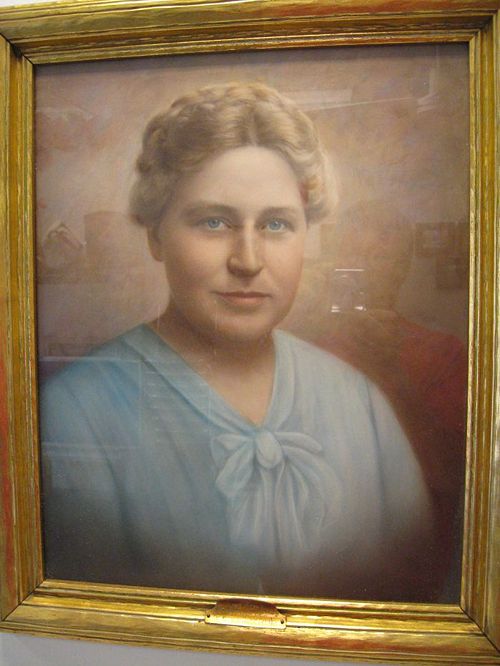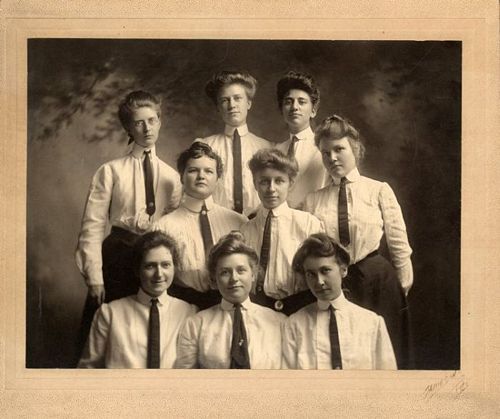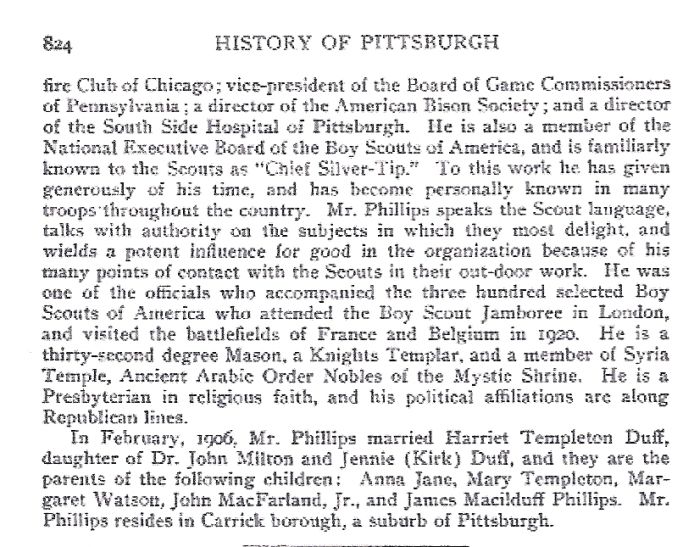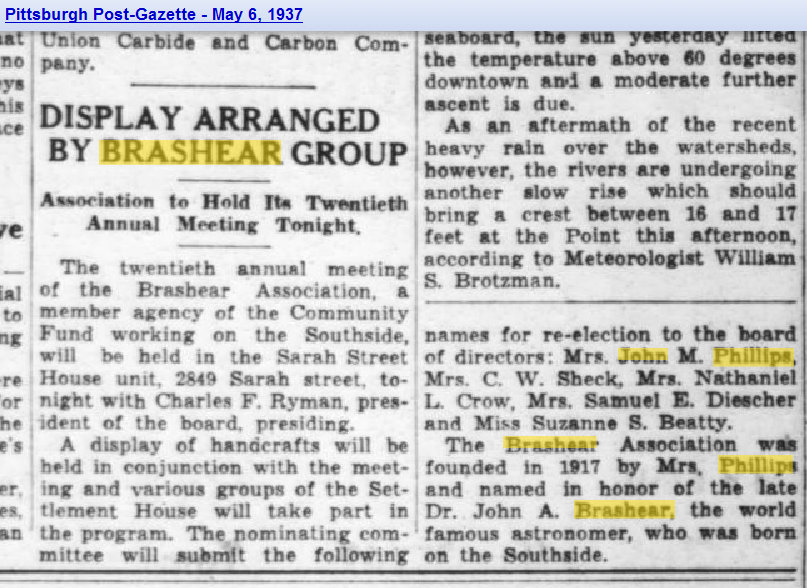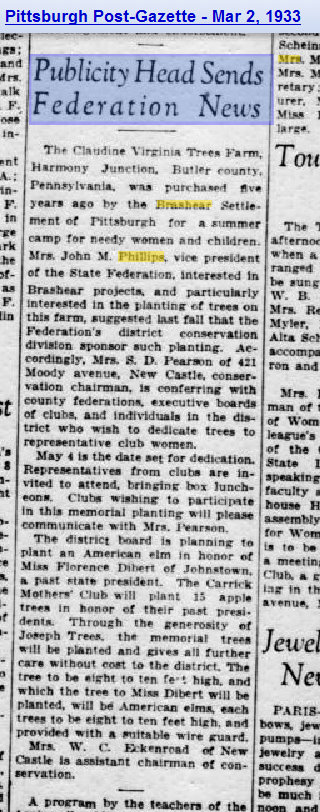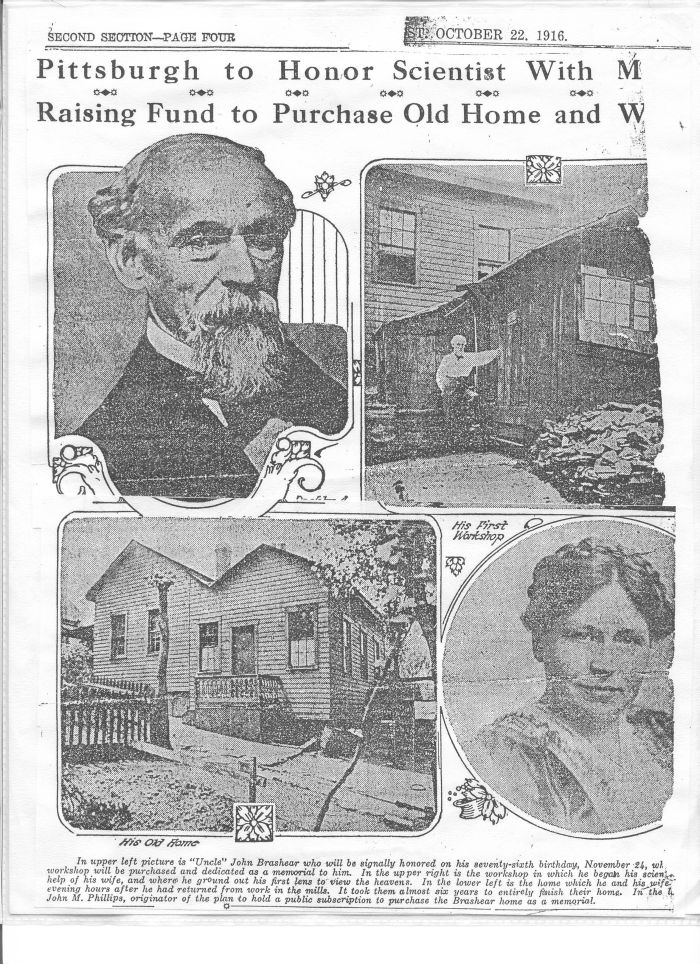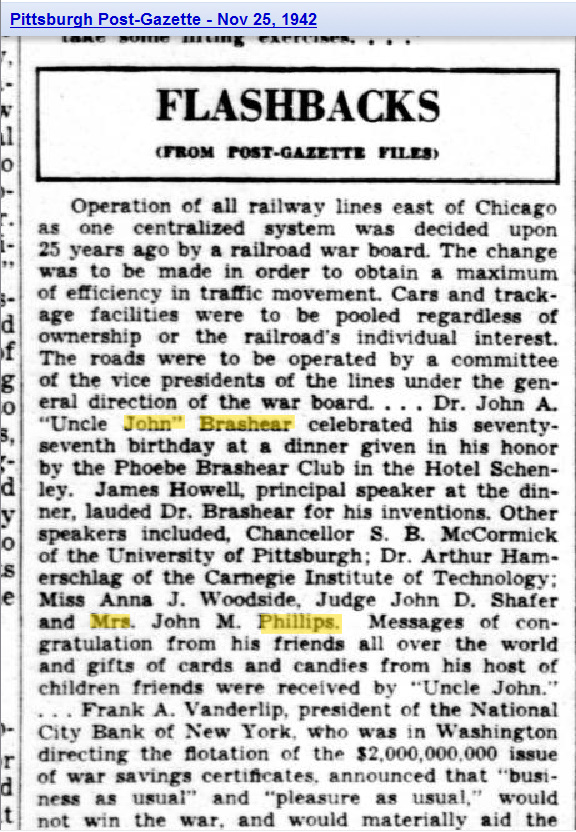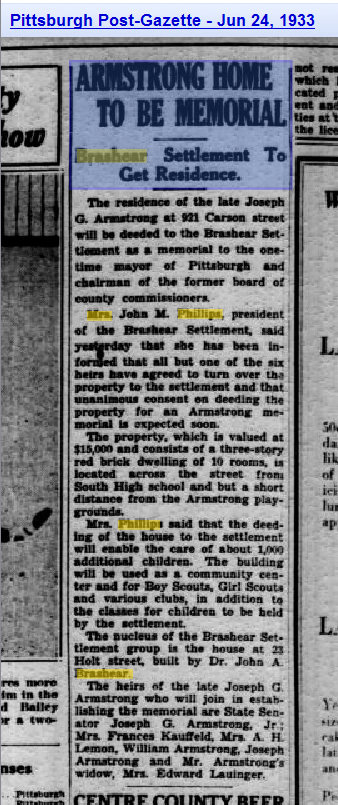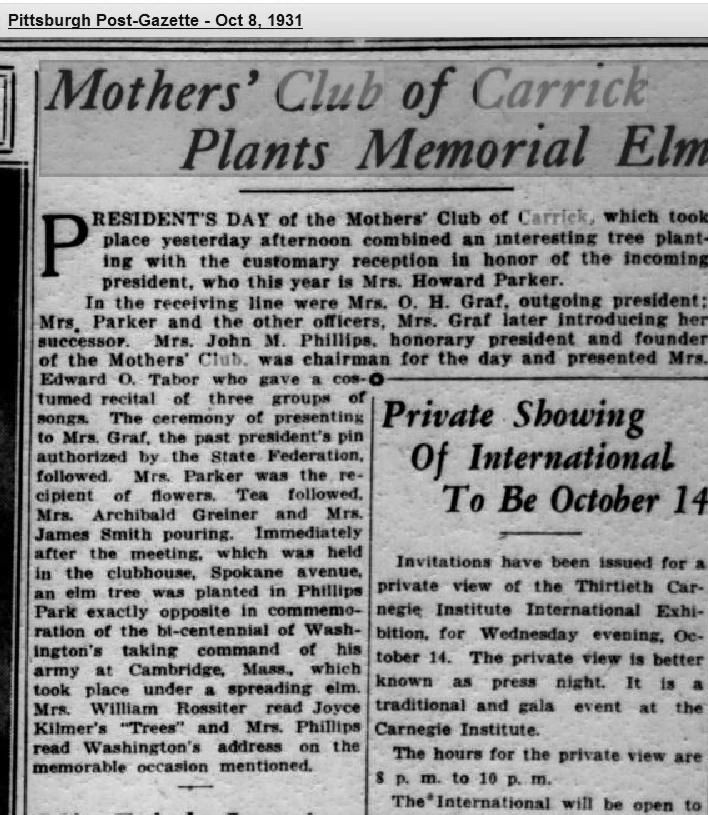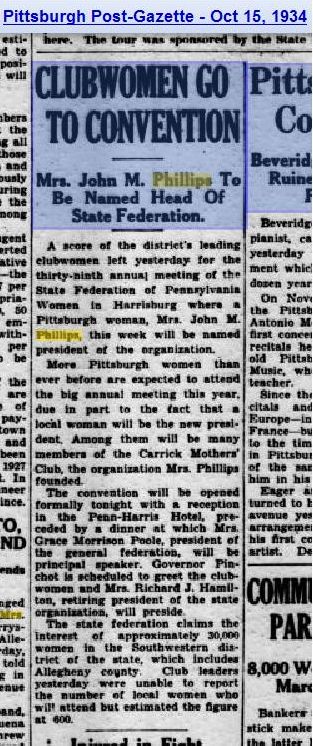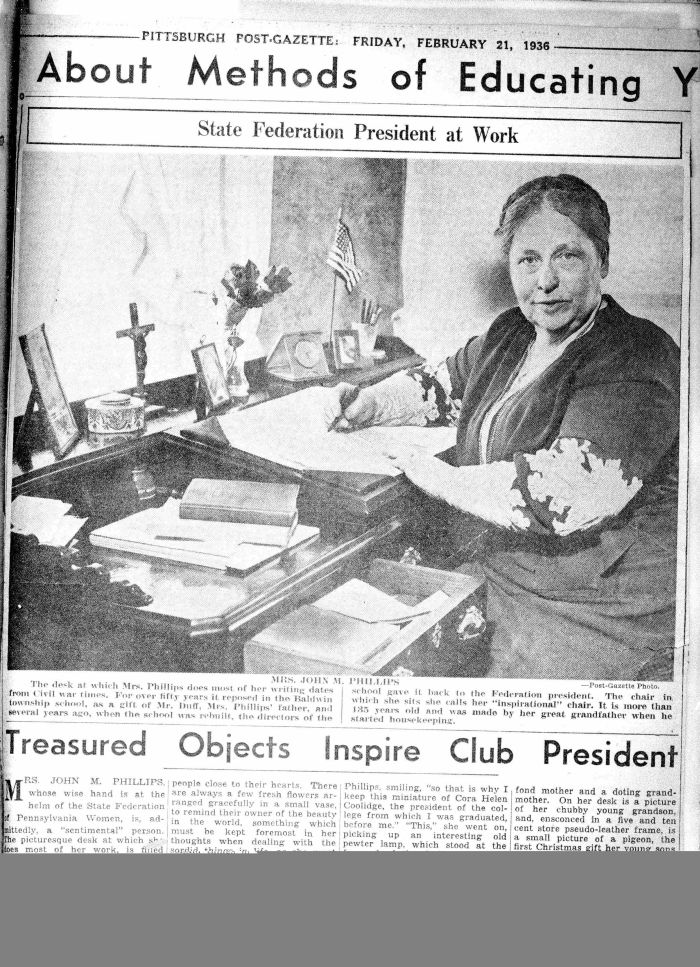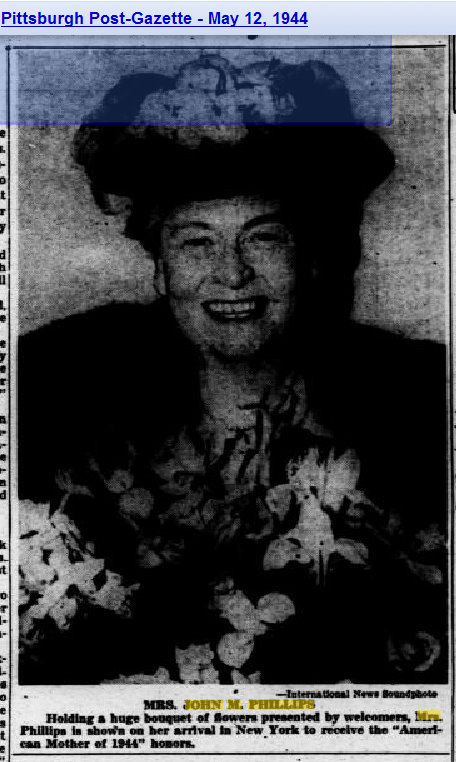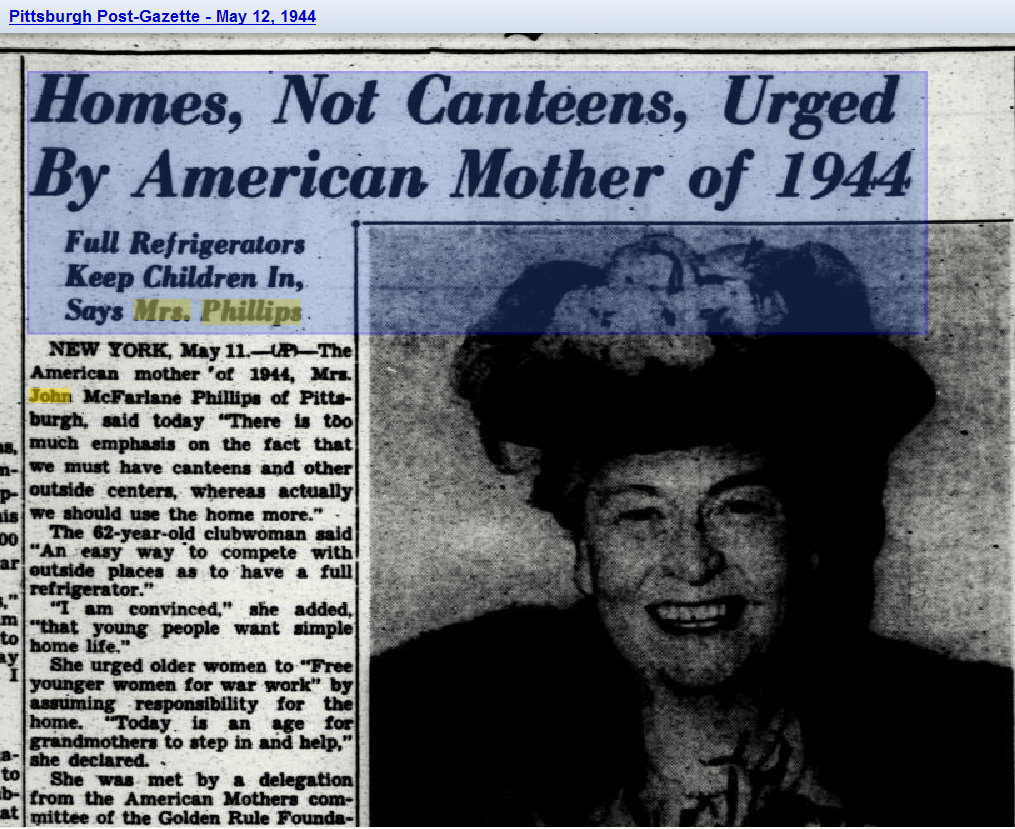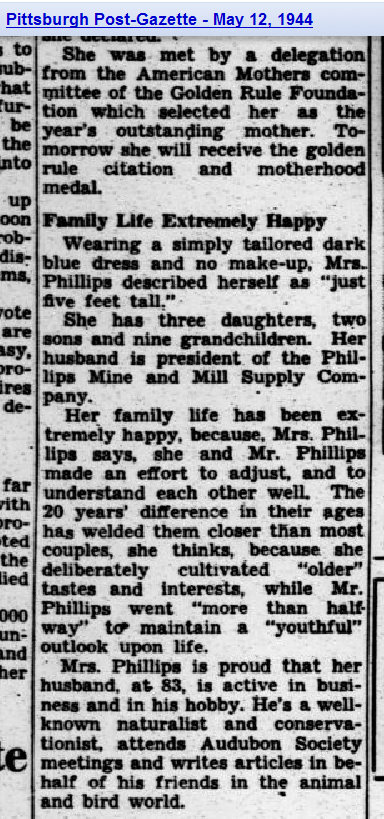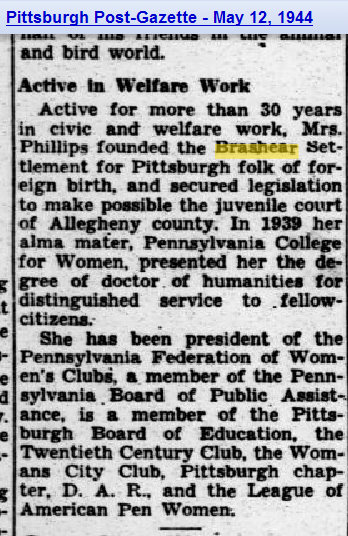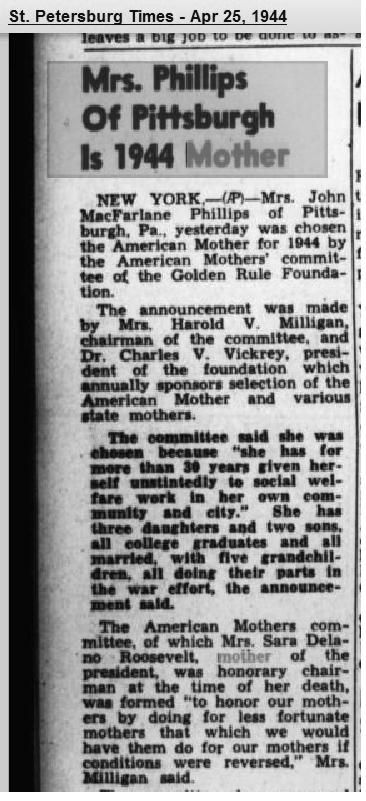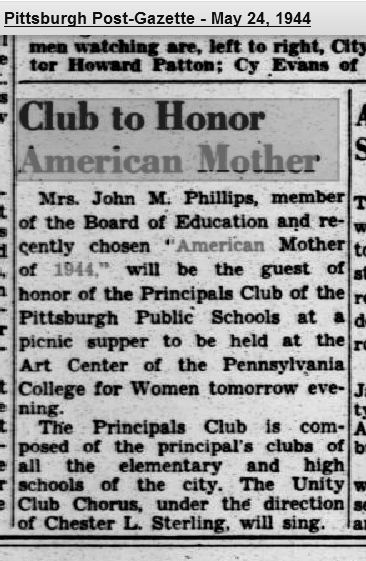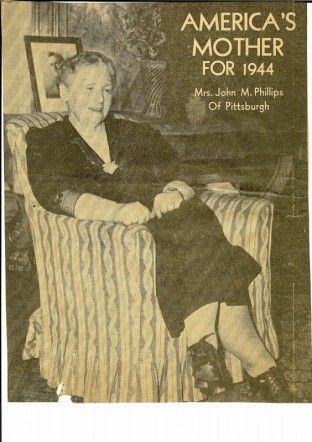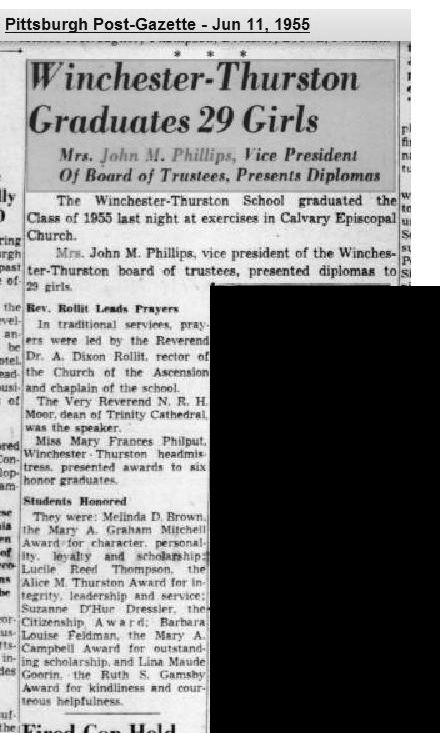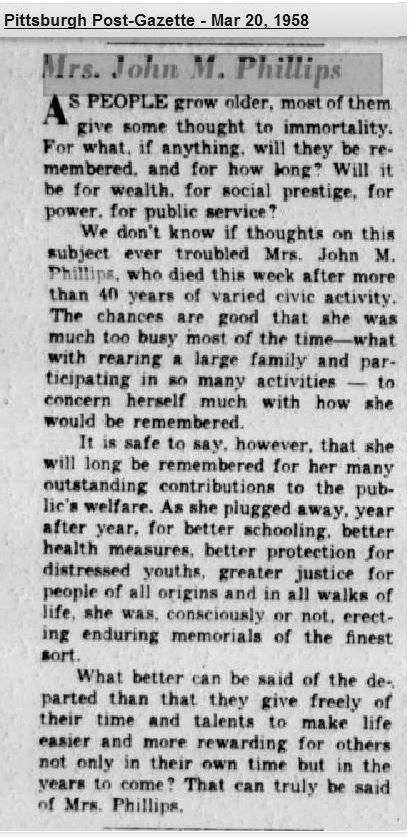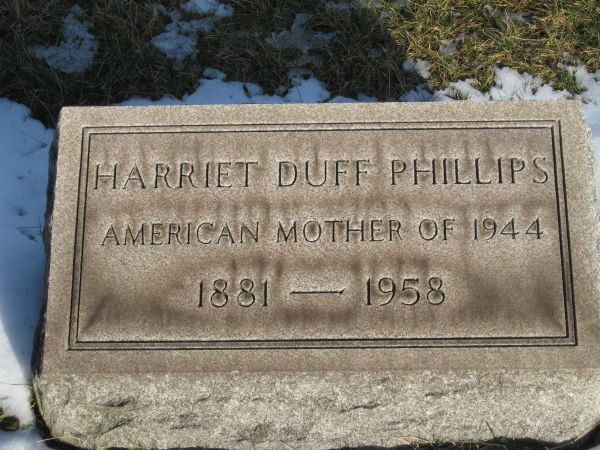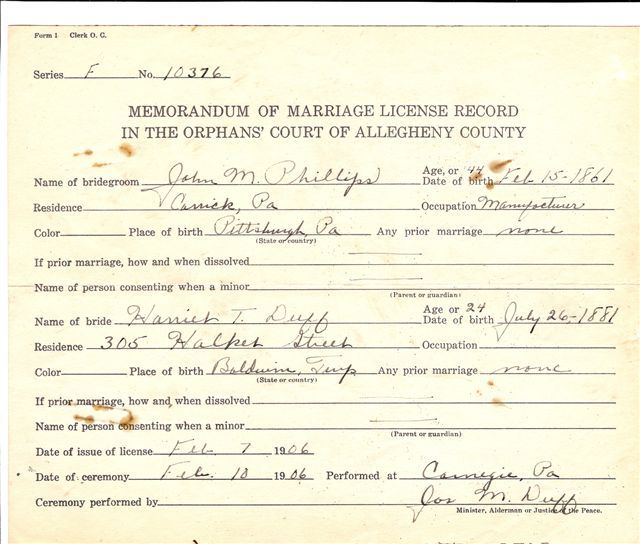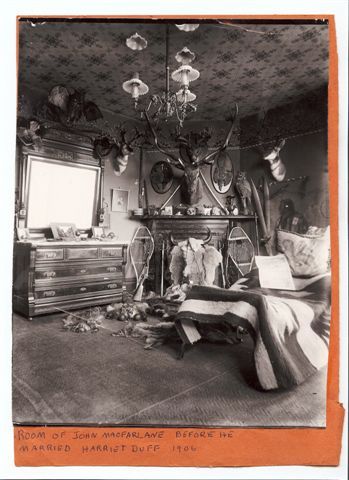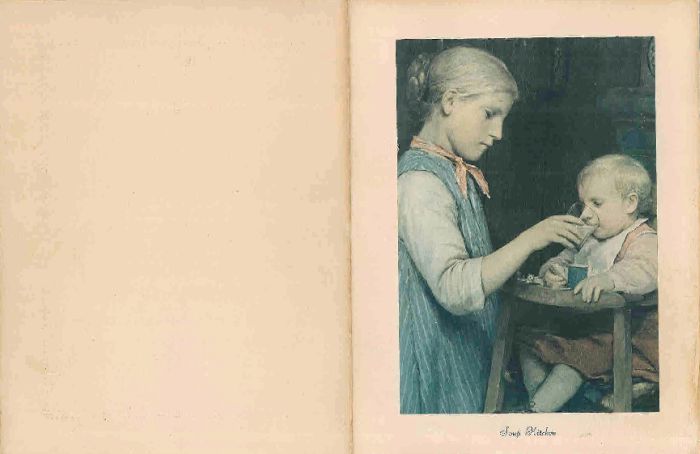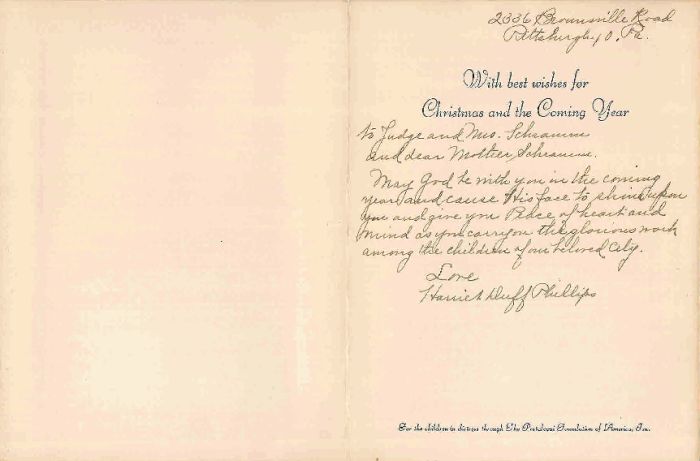Harriet Duff Phillips
Contents
- 1 Harriet Duff Phillips was the wife of John M. Phillips. Harriet Duff Phillips was also the daughter of Dr. John Milton Duff and Jennie (Kirk) Duff also of Carrick.
- 2 Title: Graduating Class of 1903
- 3 This an biography of Harriet's husband, John M. Phillips, which mentions her. The page image is from:
- 4 Harriet Duff Phillips founded the Brashear Association in 1917.
- 5 In 1933 she was instrumental in the founding of Camp Claudine Virginia Trees of the Brashear Association for needy children.
- 6 And she was very involved with Dr. John Brashear's work and preserving his legacy and image.
- 7 A 1916 article about preserving his home:
- 8 And in his 70's in 1942:
- 9 In 1933 she arranged for a further housing of needy children in the South Side:
- 10 DISTINGUISHED DAUGHTERS OF PENNSYLVANIA AWARDS
- 11 9 - 4 THE PENNSYLVANIA MANUAL
- 12 Harriet Duff Phillips' daughter was similarly honored in 1976:
- 13 In a 1931 Post-Gazette article she is noted as the founder of the Mothers' Club of Carrick
- 14 She was named president of the State Federation of Pennsylvania Women in 1934 and member of the Pittsburgh club.
- 15 In 1944 Harriet Duff Phillips was named American Mother. Shown here on the right are three newspaper clippings from the Pittsburgh Post-Gazette, St. Petersburg Times and again in the Pittsburgh Post-Gazette in 1944.
- 16 Harriet Phillips was also a trustee for the Winchester-Thurston School.
- 17 The following is an article about Mrs. Phillips from a student in Phillips Elementary School on the South Side of Pittsburgh.
- 18 Who Was Phillips Elementary School Named After?
- 19 --From the Pittsburgh City Paper, April 12-April 19, 2000
- 20 Mrs. Phillips died in 1958; at right is her obituary in which it was noted her 40 years of civic activity, for better schooling, better health measures, better protection for distressed youths, and greater justice for people of all origins and in all walks of life.
- 21 Mrs. Joyce Chalfant donated this Autobiography of Harriet Duff Phillips for which the Carrick Overbrook Historical Society is grateful.
- 22 I Learned to Love His Wildlife
- 23 by Harriett Duff Phillips
- 24 The following Christmas Card was donated by one of our readers. No date on this. Anyone with knowledge of the Judge noted here would be appreciated.:
- 25 Undated memoir of Harriet Duff Phillips
Harriet Duff Phillips was the wife of John M. Phillips. Harriet Duff Phillips was also the daughter of Dr. John Milton Duff and Jennie (Kirk) Duff also of Carrick.
Title: Graduating Class of 1903
Date: 1903 Creator: Unknown Location: Unknown Address: Unknown Description: This posed group photograph includes all nine members of the class of 1903. The graduates are: Harriet T. Duff, (Mrs. John M. Phillips); Eleanor Fitzgibbon, (Mrs. Charles St. George); Anna R. Hunter; Ruth F. Johnstin; Anna M. Petty, (Mrs. John M. Irwin); Sarah Pfeil, (Mrs. E. Brown Baker); Mary G. Wilson, (Mrs. John Coleman); Jennie E. McSherry, ( Mrs. Spencer R. Smith); and Hilda R. Sadler. The Chatham College Archive does not at present contain information that permits matching the names to the faces. Subjects: Pittsburgh, (Pa.) Shadyside (Pittsburgh, Pa.) Women College Students--Pennsylvania--Pittsburgh Chatham College Pennsylvania College for Women Duff, Harriet T. Fitzgibbon, Eleanor Hunter, Anna R. Johnstin, Ruth F. Petty, Anna M. Pfeil, Sarah Wilson, Mary G. McSherry, Jennie E. Sadler, Hilda R. Identifier: PCW000028 Rights: Chatham College cannot, does not, and will not warrant and represent that it owns the copyright in the described photographs. It can only warrant to you that it is the owner of such photographs in the Archives Collections. If you have any questions concerning the copyright of any of these photographs, you should independently make a determination as to whether any third party is claiming to own the copyright of the same and you should not rely on any representation, expressed or implied, other than this representation to you that these photographs are a part of its Archives. Ordering: Information (PDF) Information: If you can provide additional information about this photograph, please contact the Chatham College Archives. Collection: Chatham College Archives Image Collection
This an biography of Harriet's husband, John M. Phillips, which mentions her. The page image is from:
Title: History of Pittsburgh and environs, from prehistoric days to the beginning of the American revolution Vol. 3 / By George Thornton Fleming. Author: Fleming, George Thornton, 1855-1928. Collection: Historic Pittsburgh Full-Text Collection Historic Pittsburgh Full Text Collection link
Harriet Duff Phillips founded the Brashear Association in 1917.
In 1933 she was instrumental in the founding of Camp Claudine Virginia Trees of the Brashear Association for needy children.
And she was very involved with Dr. John Brashear's work and preserving his legacy and image.
A 1916 article about preserving his home:
About John Brashear click here
And in his 70's in 1942:
In 1933 she arranged for a further housing of needy children in the South Side:
DISTINGUISHED DAUGHTERS OF PENNSYLVANIA AWARDS
9 - 4 THE PENNSYLVANIA MANUAL
In 1948 a group of influential women suggested to Governor James H. Duff that outstanding women of Pennsylvania be recognized for their leadership and contributions to the state. The plans to honor these women developed into the Distinguished Daughters of Pennsylvania Awards, and the first awards were given in 1949. Each year, state organizations nominate women in recognition of outstanding accomplishments of statewide or national importance. Quality of achievement of the individual comes first. The Daughters select the names to be given to the governor for approval.
1949
Louise Bush-Brown (Mrs. James) .............................Ambler
Anita Porter Clothier (Mrs. William J.)...............Valley Forge
Charlotte Fasy (Mrs. Francis I.) ............................Drexel Hill
Lena L. Orlow Ginsburg (Mrs. Abram) ...............Philadelphia
Vira Heinz (Mrs. Clifford S.)..................................Pittsburgh
Althea K. Hottel, Ph.D. (Mrs. A. Stauffer)...........Philadelphia
Caroline M. Huber (Mrs. John Y. Jr.)......................Haverford
Victoria Lyles, Ph.D. .....................................Wagoner, Okla.
Pauline Berry Mack, Ph.D. (Mrs. Warren B.).......Denton, Tex.
Katherine Elizabeth McBride, Ph.D.......................Bryn Mawr
Gertrude H. McCormick (Mrs. Vance C.) ..............Harrisburg
Catherine MacFarlane, M.D...............................Philadelphia
Harriet Duff Phillips (Mrs. John M.) ......................Pittsburgh
Mabelle K. Price (Mrs. Walter)..........................Philadelphia
Francis Anne Wister..........................................Philadelphia
Marian M. Wunderle (Mrs. Horace G.).........................Rydal
Mary Curtis Zimbalist (Mrs. Efrem) ...................Philadelphia
Harriet Duff Phillips' daughter was similarly honored in 1976:
1976 R. Jean Brownlee, Ph.D.....................................Philadelphia
Loti G. Falk (Mrs. Frank Gaffney)...........................Pittsburgh
Sarah Lee Lippincott (Mrs. Christian Zimmerman) ..................Kennett Square
Sondra Stark Osler (Mrs. William Hull) ..........Wormleysburg
Sister Jane Scully, RSM .......................................Pittsburgh
Anna Jane Phillips Shuman (Mrs. Joseph)............Pittsburgh
In a 1931 Post-Gazette article she is noted as the founder of the Mothers' Club of Carrick
She was named president of the State Federation of Pennsylvania Women in 1934 and member of the Pittsburgh club.
In 1944 Harriet Duff Phillips was named American Mother. Shown here on the right are three newspaper clippings from the Pittsburgh Post-Gazette, St. Petersburg Times and again in the Pittsburgh Post-Gazette in 1944.
Harriet Phillips was also a trustee for the Winchester-Thurston School.
The following is an article about Mrs. Phillips from a student in Phillips Elementary School on the South Side of Pittsburgh.
Phillips Elementary School article
Who Was Phillips Elementary School Named After?
--From the Pittsburgh City Paper, April 12-April 19, 2000
It' s hard to imagine two people who better embodied the principles of urban public education than John MacFarlane Phillips and Harriet Duff Phillips. She was a school board member and community activist; he once maintained a backyard zoo and had extensive experience with firearms. The two were longtime residents of Carrick, where they shared a 17-room mansion called "Impton" ... which come to think of it, wouldn't be a bad name for a school either.
John M. Phillips was an industrialist, the president of Phillips Mine and Mill Supply Company, which had a sizeable plant on the South Side. But he was best known as a hunter and conservationist. A woodsman who shared the turn-of-the-century environmental ethics of Theodore Roosevelt, Phillips helped craft Pennsylvania's game laws, which served as a model for similar restrictions adopted in other states. The new rules weren't universally beloved, however, especially by recent immigrants used to living off what they could hunt. And after 11 game wardens were shot while trying to enforce the game laws in 1905, Phillips fought for the passage of the Alien Gun Law, which prohibited non-citizens from packing heat. Phillips fought a constitutional challenge all the way to the U.S. Supreme Court and won. (It's anyone's guess where this would have gotten Phillips in his current political climate: If you hear a gun-rights supporter talking about an Alien Gun Law today, he's probably worried about losing his rights to defend himself from extraterrestrials.)
Of course, Phillips also killed lots of animals - on one occasion he gave a set of five dead jaguars to the Carnegie Museum - and he also shot a nationally famous prize-winning photograph of a mountain goat. A 1932 article in the Post-Gazette maintains that he once kept a small private zoo of 14 animals behind a house.
He also helped found the Boy Scouts of America, and was known to scouts - I'm going to insist on some decorum here, people - as "Chief Silver Tip." Harriet Phillips was even more devoted to youth. She'd grown up attending the Humboldt school - which the school bearing her own name was built to replace - and served on the city's school board for 14 years. She participated in the civic activities suitable for a woman in her station - she helped raised funds for the South Side Hospital, which her father founded, for example - but was also, a fairly progressive political voice. She agitated for women to have greater opportunity both in business and in public life and was an outspoken advocate - at least for the pre-civil rights era - for better race relations. She also helped lead the fight for a juvenile justice system that would treat young offenders more compassionately.
Such work won her awards ranging from "Distinguished Daughter of Pennsylvania" to "American Mother of the Year." No doubt Mrs. Phillips' homespun child-rearing wisdom played a part in her success as well: If you're trying to keep the kids at home, she once said, "An easy way to compete with outside places is to have a full refrigerator: ... which might be a solution for Pittsburgh's youth drain right here. "I am convinced that young people want simple home life," she maintained. Well, that and stadiums, presumably.
Appropriately enough, given the couple's mutual success, Phillips School was the first and only city to be named after a husband and wife. But both John and Harriet Phillips had died by the time the school had opened in 1959; Harriet the previous year and her husband in 1953, three years before the school board unanimously decided to grant the proposed new school its name because of the couple's "great contributions to the South Side Community."
Which is too bad: Given the fractious nature of just about every school board debate since the naming of the Phillips School, maybe our system would benefit under the watchful eye of a strong maternal figure. Or an accomplished marksman.
(Potter, Chris "Who was Phillips Elementary School in the South Side named after?" Pittsburgh City Paper, 12 April, 2000, News and Views - You Had to Ask)
Mrs. Phillips died in 1958; at right is her obituary in which it was noted her 40 years of civic activity, for better schooling, better health measures, better protection for distressed youths, and greater justice for people of all origins and in all walks of life.
Mrs. Joyce Chalfant donated this Autobiography of Harriet Duff Phillips for which the Carrick Overbrook Historical Society is grateful.
I Learned to Love His Wildlife
by Harriett Duff Phillips
The wedding trip was over. I followed my husband up the long flight of stairs to the second floor front room of the Victorian house he had built for his Mother. Here Mrs. Phillips greeted me at the door; she had just lighted the flickering gas jets to welcome me to the ‘Crow’s Nest” as John called the room which had been his bachelor’s paradise for many years. He had told me about this room but it was uniquely masculine beyond my wildest imagination. I hesitated a minute in the doorway and he seemed to sense my bewilderment. “This is only for a little while,” he said as he helped me off with my coat. “Some day we’ll have our own home and it will be just as you want it.”
(The photo is from the collection of Joyce Chalfant. This is the famous "Crows Nest" bedroom in his mother's home, John M. Phillips.)
The room was very large; a high ceiling and five windows but no curtains. It didn’t take long for me to learn his dislike for curtains; they kept out the sunlight. On the wall above the fireplace hung a huge elk head. A buffalo scull with vicious looking horns occupied the center of the mantel. At the other end a stuffed horned owl glared at me with its glass eyes as though I were an intruder. In a corner leaning against a rack was a small sized arsenal … every kind of gun imaginable. A precious one that had belonged to Buffalo Bill lay on the table along with a pile of photographic equipment. There was a collection of skees (skis) and snowshoes and Indian paraphernalia. Under the bed were boxed and boxes of stereo pictures, the kind you looked at through a very popular gadget of that time … a kind of little frame telescope with a handle. Over the head of the bed hung one of the largest grizzly bear hides ever brought out of British Columbia, its mounted head resting in the center of the pillow.
But I forgot the Wild West atmosphere of the room when I saw the wall back of the bed lined with sectional bookcases filled with several hundred books. There was only one library in Pittsburgh at that time and to have all the books I could possibly read in my own room was like manna from Heaven. I knew that John loved books for he had always carried one with him when he came to see me. “To read on the street car,” he would say. However, it always happened to be a carefully selected book he thought I would enjoy reading aloud to him. To make talk was simply impossible for John even as a lover. The books helped out. How my brothers and sister and cousins had teased about this book courtship! His first gift to me was a beautiful set of Shakespeare, Temple Edition.
The old bear did disturb me that first night, but it apparently was not John’s practice to move it. Every time I turned my long braids caught in his teeth. Next morning I asked my husband to hang him over the foot of the bed but there too, he a nuisance to my feet. I suggested he put his precious bear on the floor in the parlor bay window. Grizzly was transferred without a word of complaint. Sunday afternoon a week later we were out walking. Pathetically, John asked to bring Grizzly back to our room and said he would give him to me as my very own if I would agree. The answer was very simple for it had not taken many days for me to understand that if I were to be the successful and happy wife of John Macfarlane Phillips, I would have to learn to love his wildlife.
For me, a city girl not long out of college and totally ignorant of the business world and the great out-of-doors, I adjust myself to the life of a man of experience, an industrialist, explorer, naturalist and civic enthusiast twenty years older than myself was an Herculean challenge. But I had resolved with inherited Scotch-Irish determination to sabotage the prophesy of both John’s friends and mine, too, that twenty years difference in ages never could result in happiness.
To-day as I look at this wonderful man, physically strong, mentally alert and active in his 88th year, and live in retrospect our forty-three years of abundant life together, I am moved to share some of my experiences, hoping they may be helpful to others in this age of broken marriages.
Each time John Phillips asked me to marry him; there was one objection on my part which it didn’t seem possible to overcome. I thoroughly hated the place he lived and where he had spent most of his life. It was a smug, narrow, introvert, semi-rural community called Carrick. Sounds as though it might be in Ireland, but it is in the hills south of the Monongahela River about six miles from the heart of Pittsburgh. To-day it is a suburban part of the city.
I knew this community for I was born there in the home of my maternal Grandfather Kirk, a Presbyterian preacher of the rigid Calvinistic church. He was tall and gaunt, much like Abraham Lincoln in appearance … never stepped beyond the gate unless attired in his Prince Albert and high silk hat. He was a graduate of Yale University and Princeton Seminary. His Princeton Diploma of 1848 hangs on my wall. Grandfather was a great Greek and Latin student. I was just beginning Latin the year he died and I remember standing beside his coffin wishing that through some miracle he could bequeath me even a little of his knowledge.
My paternal Grandfather Duff was a city doctor. He died when I was three years old. Father, too, was a doctor and immediately after Grandfather died arranged to move from his home in the country to the city and take over his Father’s practice. I remember distinctly the day I was anchored in this new home and many of the enriching experiences of childhood. Father was the greatest teacher I ever had. In those horse and buggy days he would ask me to ride with him as he made his professional calls and I loved to go with him. It gave an opportunity for him to talk about life and to stimulate my interest in education. He was an ardent student of the human mind. To-day he would qualify as a psychiatrist. Father was a human dynamo of energy. Even after he gave up his general practice for his special field, Obstetrics and Gynecology, he would drive miles or ride horseback to see some old patient back in the country where he had practiced as a young doctor. I remember one of his experiences on such a call.
Mrs. S. had been ill for sometime and she begged her husband to have Father see her. It was bitter cold weather, deep snow and almost impassable roads, but nothing ever deterred him if he thought he could relieve human suffering. After Father had examined the patient he stepped to the foot of the bed beside the husband. “Well, Doc, how much is it,” said Jake. “That’s all right, we’ll talk about money later,” answered Father. “But I insist on knowing.” “I’ll send you a bill, I’m thinking about your wife now.” “By heck, you’ve got to tell me.” “Well,” said Father, “It’s $25.00.” Jake looked at Father then at Mary. “Now for this you shan’t have a tombstone,” he bellowed at his wife.
Father was the Founder of the South Side Hospital in the industrial South Side of Pittsburgh, was one of the Founders of the Medical School of the University of Pittsburgh and delivered the address of welcome to the first class and the first lecture in obstetrics. He never worried about making money out of human ills so he didn’t leave a fortune in gold, but he did bequeath to me his love for people and an interest in many of the spiritual things that enrich life.
As I grew older, even though I hated Carrick, I never missed an opportunity to spend a week-end there with Grandmother Kirk in her home where I was born. She was a charming woman of New England birth and background. Even as the wife of a poor parson with nine children, she never lost her patrician personality, her love for the cultural or her high ideals.
The Phillips Family were pioneers in Western Pennsylvania and the iron business. The older Phillipses were members of Grandfather’s church and neighbors for years. John himself was a contemporary and friend of Father and Mother, so I knew him when I was a little girl and when young ladies were trying their best to ‘catch him’. But he was always too busy studying, attending to his business and working on his inventions for coal mine equipment to take mush time for girls and social life. I knew his background so well that I was very certain we could harmonize our lives if only he would decide to live in the city. The day of decision came. He and Doctor William T. Hornaday, the naturalist, had collaborated in writing a book, ‘Camp Fires in the Canadian Rockies’. The publishers (Scribners) were clamoring for the proof and it was necessary for the co-author to go to New York to help with the proof reading. If I would agree to be married in a few weeks, about the first of February, John would agree to live in the city. For a few days I was in Seventh Heaven. As my Mother, Aunt Ida and I sewed the yards of lace on my hastily planned trousseau, they tactfully and subtly set me to thinking how foolish I was to insist that John give up his many civic projects in Carrick to live in the city.
I thought it over seriously and a few evenings before our wedding day surprised John with my decision to live in Carrick … the wisest decision I every made. Now he knew I loved him. There was no time to plan for a house which made it necessary to go to his ‘Crow’s Nest’ after the honeymoon.
I have often wondered how such a tall, thin, wiry fellow, and so serious minded, could fall in love with such a short, dumpy fat, fun-loving young woman as I. One of our little daughters wondered this too. She asked her Father, “How did you happen to marry such a fat wife?” He had been tutored by an old Indian Chief when a little boy so often answered the children in Indian terms. “Big Indian like fat squaw.”
After a few months at the old home we arranged for a dream house of our own. Everything in it was as pretty and feminine as I could wish, with one exception. The dining room was finished in heavy dark oak and I suggested painting it mahogany to match the Chippendale mahogany furniture I had selected. “Paint over that natural wood and blot out the grain! Why that would be sacrilege,” my husband protested. In humble wifely fashion I yielded to the oak and selected matching furniture. It is well I did. The Chippendale would have been sawdust long ago. The solidly built oak has stood the test of rollicking children, boy and Girl Scout parties, class meetings, my club meetings, family reunions, and it will no doubt serve our children’s children.
In the new home housekeeping was done my way for about a month, with all evidences of the Hunt and Wildlife stored in the cellar. One Saturday afternoon I went to see Mother. When I returned and saw the disheveled rooms, boots or every description, hunting coats, khaki trousers, sleeping bags, pup tents, fishing tackle, boxes and boxes of cartridges all scattered over the beautiful new green carpet, I threw up my hands in despair. Before I had time to scold though, John whooped like an Indian, “We’re going to British Columbia, you and I next week.” The confusion meant nothing to him; John was seeing the snow capped Rockies, their Tamarack slopes, his beloved Elk River, his old guides. Through the years that followed, John often transferred the out-of-doors into the house but I accustomed myself to his way of life and liked it. There never was any monotony for he developed so many enthusiasms which brought interesting people to our home. The guests the children enjoyed most were Indian friends … one in particular who refused the refuge of a bed at night, insisting upon rolling up in a blanket and sleeping on the floor and eating his food in the yard under a tree.
Taking his city-minded wife on that expedition to the Rockies was a clever initiation into his fascinating world. The plan was for me to stay at a very primitive hotel in a mining town while John and the friend he was to take hunting, Joel Stoneroad, went into the depths of the Rockies for Big Horn Sheep, Rocky Mountain Goats and Grizzlies.
Charley Smith, Grizzly Smith to his associates, who had always been John’s special guide and companion and friend on the hunting trips, disapproved of this plan for me. Instead, he suggested that I ride on the supply wagon out to his small ranch on the Elk River, from which the expedition was to start, and stay with his sister Cynthia and her husband Billie Bullock. Billie was the driver of the wagon. John let me decide, and of course it was the Ranch. It sounded a lot more adventurous than the hotel idea. In an hour’s time I was ready to take my place beside Billie on the wagon.
As we bumped along over the rocky road John rode horseback beside us. Grizzly, his two associate guides, Mack and John Narboe, the cook and general handyman, headed the party. My imagination held sway and I was a pioneer woman bravely facing the perils of our forefathers who dared to travel into uncharted places.
Billie had a difficult time keeping the horses from stumbling and upsetting the wagon. His eyes were on the horses, but his mind was on trying to prepare me for the meeting with his wife. Billie was quite good looking; he told me he was only thirty-two years old, but his whickers made him look much older. His wife, he said, was sixty-four and a grandmother. But, he added, “We don’t marry so much for love’n out here as for convenience. Cynthia and I get on pretty good. We’ve learned to like each other enough that we live peaceable like.”
When we drew up to the clearing beside the cabin Cynthia came out to meet us. Little wonder Billie wanted to prepare me and save me from shock. She looked like a woman of eighty who had shriveled under desert sun. She was as brown and wrinkled as a dried apple and the hand she extended was simply bone with a thin skin covering. After a few days with Cynthia I forgot about her worn out body and saw only her mind and heart. She was a beautiful soul lost in a gigantic forest from which there were no trails out.
There was only one small room on the first floor of the cabin. It was next to the lean-to wood shed, the home of packrats I soon learned. There was a bed in the unfinished loft, so Billie and Cynthia took it and graciously assigned me the first floor room. But such a night with those rats running around and a big bat in the room! The men pitched ten tents in the clearing close by the cabin. Next morning every one was up at dawn preparing for the departure of the hunters. Again Grizzly came to my rescue, telling John Phillips there was no reason why I couldn’t ride along on the supply wagon to the first camp. Much to my surprise John liked the idea and so I was off with the pack train. I thrilled with every experience until almost the end of the day when it was necessary to ford a treacherous looking stream. Always a coward in water, and never able to learn to swim, I was terrified as the water rose higher and higher over the horses’ bellies. I breathed a sigh of relief when we pulled up on the bank and I learned it was only a short distance to the camp site. The guides had ridden on ahead and were in the process of setting up the camp when Billie and John and I arrived. John had ridden close by me all the way. While the cook was getting his fire well started and mixing the bannock in the flour sack to bake on a reflector I had my first fishing experience. All I knew about fishing was from a College English assignment, a review of Sir Isaac Walton’s ‘Complete Angler”. In a very few minutes I caught six beautiful trout. No skill was necessary for there were so many they jumped out of the water like porpoises.
Sitting around the blazing pine camp fire that night under the starry and moonlit sky, it was difficult to realize that the majestic moon lighting the snow capped mountain peaks was the same clouded moon that moved through the starless sky in Pittsburgh. John and Mack Narboe, who had been cow punchers on Texas Ranges before they migrated north to take up trapping, told unbelievable stories of adventure. So did Grizzly Smith. One he told I can never forget. He said that it was a very cold winter night; the sun had set early and he was very tired. When just about to roll up in hi blanket for a much needed sleep he suddenly heard an unusual noise … sounded like a horse coming down the mountain trail. Alert, he grabbed his gun just as an Indian rode up. The horse dropped dead throwing the rider. As he got up the Indian’s hand caught back his blanket exposing fresh scalps hanging from a rope belt. “Lay down there you murderer; if you move an inch I’ll shoot you dead,” Grizzly shouted. The Indian was pretty well exhausted and willing to do what he was told, no doubt thinking it would give time to revive himself. The Lone Trapper wondered how he could possibly keep awake through the night. He knew too well what would happen if he fell asleep. The Indian would kill him, steal his horse and escape. Grizzly kept awake until dawn but was sure he couldn’t hold out much longer. As he was struggling with his conscience to get courage to kill the Indian he heard the sound of several horses. “At least I’ll get this Indian,” he said to himself as he raised his gun. Then he saw the first horse and rider, then another and another. They were Canadian Mounted Police on the trail of the Indian. “I think I have your bird here,” Grizzly said, “Thank God you’re just in the nick of time. I was about to finish him.” The police too, were exhausted having traveled all night to catch up with the murderer of a family. After a little rest and a sparse breakfast the police started back to the Fort with the culprit carefully guarded. The Indian proved to be Tom Savage, on of the most vicious murderers of the North West Country. He was tried, found guilty of murder and hanged.
With all the exciting stories and the thrill of a camp fire, the weariness that follows a long day’s travel overtook me and I was ready for my first night in a sleeping bag. About three o’clock in the morning I heard the men talking and fussing around. Joel Stoneroad had taken desperately sick and was in severe pain. The guides thought he must have appendicitis and were consulting as to whether it was advisable to start immediately on a trek to the nearest hospital about 75 miles away, or take a chance on delay. The decision was to delay and it was well they did for after a few hours Joel felt better. Quite naturally this flare up postponed going into the mountains. For a week I stayed in camp with the pleasure of short trips into places John had been on previous hunts. One was to see Lake Harriet which he had discovered and ceremoniously christened in my honor.
The day of parting had to come, and as I sat on the wagon ready to leave for the Ranch, a terrible sense of fear for my husband’s safety came over me. Once he had told me about a struggle with a bear and I had visions of such a happening again. His mountain goat pictures flashed before me. One … a foolish experiment of standing on a narrow ledge of rock while taking the picture; a mis-step and he would have fallen thousands of feet into the chasm. These pictures were made into lantern slides. A professor at our University was showing the slides one night when a student asked: “What would have happened to Mr. Phillips if he had made a mis-step?” The answer: “It would have depended upon the kind of life he had led.” It was too late for lamentation. I simply closed my eyes and breathed a prayer for his protection as I have had to do many times since. What else could a woman do who had married a man with primitive instincts?
Life back at the cabin was never dull. Packrats rattling around in the wood shed at night often wakened me; sometimes it was the barking coyotes or the thunder of a giant tree rolling down the mountain side. I readily adapted myself to these. Indians, though, were different. One evening I was sitting in front of the cabin relaxing after a mountain climb when I saw two squaws picking their way down a precipice across the river; each had a bucket and were apparently gone for water. I called Billie. “They’re Injuns, all right,” he said, “Kootenays … but they’re peaceful.” In a little while we saw the Teepees and the tethered horses. Even though they were peaceful Injuns I decided to climb the ladder to the loft that night and let Billie and Cynthia have the best room. Next morning with all the pretty ribbons I could spare from my undies, a box of pins with pretty colored heads, some candy and a little change, pennies and nickels, I made friends with the squaws and children. I was truly sorry when after a few days; they started on their trek to the fall hunting grounds.
Five weeks of exploring and hunting and John returned with some fine museum specimens. He had promised to reward me for my patience so planned a trip down the Columbia River, then to the Pacific Coast, returning home via Lake Louise and Banff. We were in Victoria when John received his copy of ‘Camp Fires in the Canadian Rockies’. There was a letter awaiting him from Dr. Hornaday saying, “Today I have given the first copy of our book to the best wife on the Atlantic Coast. The second copy goes to you.” My thoughtful husband read me the telegram he sent Dr. Hornaday. “Great to see our book. I have given my copy to the best wife on the Pacific Cost to balance the Continent.”
Little wonder that God’s great out-of-doors had a new meaning to me after this experience. The boxes of animal pictures under the bed were no longer just nuisances to be dusted. Before long John suggested having them made into lantern slides to use for picture shows for our friends. These shows, especially on the lawn in the summer evenings, gave as much pleasure to hundreds of neighbors and friends as do movies today. Two days after our first baby was born, a little girl Anna Jane, Grandmother Phillips died. In her last conscious hours, while anticipating the baby, she would repeat that age-old question. “Isn’t it strange, one life going out, another coming in? One generation passeth and another commeth!” Another generation did start life in the old home for John bought the place he loved. In a few months we left the little dream house and established ourselves in the ‘story book house’ as one of our little grandchildren has recently called it. It’s a rambling old house, in no way pretentious, a barn, nine acres to romp in and magnificent old trees whose crotches make sanctuaries for birds. (House 2336 Brownsville Rd. Carrick)
Now life changed for me. Four more babies were born, making our family three girls and two boys, Anna Jane, Mary Templeton and Margaret Watson. (They were named for two grandmothers.) John Macfarlane Junior and James Macilduff Phillips. (My paternal ancestors had been Macilduffs but dropped the Macil several generations ago.”
There were scarcely hours enough in the day and night now to care for the growing family, the home and my husband’s broadening interests. In his travels he saw the dangers of soil erosion, the devastation of forests, and the vanishing wildlife. He had become a crusader for every phase of conservation. I recall his bringing home a picture of a Passenger Pigeon with the sad news that the last of the species had just died in the Cincinnati Zoo, 1914. Conservation became John’s theme song and our home became a center from which to broadcast his song. The brothers, his partners in business, complained bitterly that the birds and beasts had taken possession of the offices of the Phillips Mine and Mill Supply Company.
He kept right on urging people to make bird houses. He sponsored contests and offered prizes to school children for the best. No husband can ride a hobby unless his wife rides along with him … tandem fashion. There were days when I was ready to tell John he would have to ride alone, but he had a magic way of making me think that the only worth while thing in the world was to ride right along with him. It often meant stopping what I was doing many times a day to show little boys how to make Wren bird houses out of tin cans, or to give out gourd seeds to youngsters who promised to grow them for wren houses. Our children always raised a lot of gourds. These were gathered in the fall and hung in long lines in the cellar to dry until about February. It took real work to prepare them for use. The children would gather in their Father’s room and scrape and scrape to make the outside smooth. A little hole the size of a quarter was cut in the side of the gourd and all the dried seeds taken out. Finally the gourd was shellacked and a piece of heavy wire arranged beneath the hole for a perch, and another piece fastened to the top for hanging on the tree. I often think of the dismay with which I met housekeeping problems in bird house season, but how the joy of hearing the little wrens sing from early morning until sun-down all summer long outweighed inconvenience and confusion! Living with my John helped me develop a philosophy of life which I wish I could hand on to the Youth of our Nation. He taught me how to evaluate things for their real worth’ to use the process of selectivity in deciding where to expand time and energy. Any time spent in developing enthusiasm for conservation of our natural resources he thought was very worth while, and now as I look back through the years I know he had been blessed with vision.
Anyone who has tried to keep a bird alive on the garden variety of worms knows what an arduous task it is. As substitute John decided to raise meal worms to feed baby birds. These must be raised in large containers with a mix of damp flour, corn meal and bran. The worm, after a period, transforms itself into a black beetle-like bug which in turn lays the eggs. These rather hard shelled worms must be crushed a little before being fed to baby birds, the only part of feeding I never enjoyed.
The first time John tried to raise meal worms he put the large crock of worms in his clothespress, thinking the dark would speed incubation. He forgot about the worms until one April evening I found two black bugs on my bed … next morning a few more. Puzzled I said to John, “Isn’t it early for June bugs?” Suddenly he thought of the crock and opened the door. The bugs swarmed out. He was so disappointed that I truly felt too sorry to scold. There were days of giving out cherry and mulberry trees to school children. My bird lover would buy thousands of little trees and take time to show the boys and girls how to prune them; explain planting them, exact a promise that when the tree began to bear half the fruit was for the birds and the other half for them selves. There wasn’t a yard in our community without either a mulberry or a cherry tree. I used to sigh when I’d see the loaded truck pull into the yard and the driver begin to unload the trees, for I knew what it meant in time to distribute them.
When anyone found a bird with a broken wing or leg, or one too young to feed itself, his first thought was to bring it to Mr. Phillips, who was just like the doctor who prescribes then turns the case over to the nurse … and I was the nurse. Many a morning I went on first duty at daybreak to carry out the bird’s natural feeding schedule. Two successive summers we were the recipients of an albino robin. It was pure white with pink eyes. The meal worms proved a wonderful help in keeping the bird alive. Albinos are found among all animal life. We had an albino groundhog, absolutely pure white with pink eyes. While showing it to guests the swift little animal escaped into the yard. What a chase! The boys finally caught him. A few weeks before Jim, eight years old, had ‘Noah and the Ark’ as a Sunday School lesson. “Dad,” he said, “I don’t believe that Noah story. How could a fellow catch two animals of every kind when it was so hard to catch this one groundhog?”
Every spring some woodsman friend would make John a present of two or three crows. One year we had twelve. I always cringed when they arrived for crows have the most insatiable appetites and it usually was my lot to feed them, for with all his love of wildlife the daddy of the family did have to earn the bread and butter. Fortunately, he never aimed to be a rich man. His goal was a Bank of Service and Happiness, and as his partner I invested in the same bank, which has paid magnificent dividends. The pleasure the crows gave was a percentage of the dividends. One learned to say several words distinctly. He would sit in a tree while the boys played ball and call, “Play ball, play ball.” We can disprove the tradition that crows must have their tongues split before they can talk, for no one of our many crows ever had a split tongue.
An irate man called one evening asking if we had a crow. He said he had complained to the milk company that each morning there was a hole in the mild bottle cap and the cream siphoned off. An investigator was sent out and found our Jim to be the culprit.
A Railway Express clerk called one midnight reporting there was a large crated animal marked ‘kangaroo’ for J. M. Phillips. “Could it be possible there is a mistake and the shipment is intended for the Zoo”, he asked. I answered the telephone. Quickly I remembered that Doctor Hornaday and promised the children a kangaroo. “It’s properly directed, “I think … “just send it out in the morning.” By this time, living with a naturalist made it very simple for me to change my plans to suit unexpected animal guests. Masupa, as we called the kangaroo, took a lot of time for she attracted droves of children for several months. On an unexpected very cold night she frosted her tail, with death as the result.
“This is the last time,” I begged, when the Daddy brought home two baby black bears for the children. I’m resigning as Zoo Keeper.” These little fellows proved to be the piece de resistance of all our pets. Our Grandchildren are now enjoying the story of Whab and Muskwah. There had been a forest fire in the North-Central part of Pennsylvania and the cubs had wandered down to the edge of the forest after their mother was lost in the conflagration. The Game Warden who rescued them turned them over to my husband who was president of the State Game Commission. He happened to be at our State Capital when the bears were given to him so he put one in each side of his Gladstone bag, keeping it open and the bears secure with a clever arrangement of sticks and rope. He brought the cubs home on the train with him. Such excitement when they were turned loose on the front porch! Too young to eat, they had to be fed from a baby’s nursing bottle. After the children were in bed and everything was quiet, John suggested putting the cubs in the bath room. He assured me he would take care of them so I went off to bed, but not for long. One bear settled down complacently, the other cried and cried just like a human baby. It was impossible to sleep and when I couldn’t stand the pathetic crying any longer I wrapped the little fellow in a small blanket and took him to bed with me, rubbing his tummy just as I rubbed my baby when colicky. Finally I gave him a little paregoric and he went to sleep. For a week Muskwah was my bed-fellow … then I weaned him and put him out with his brother. For six months the bears were neighborhood pets, but in that time they had grown so big it seemed wise to send them to the Zoo. It was a tearful parting.
John’s friends seemed to rejoice when they found an animal that might please him. One sent him a flying squirrel. In transferring her from the tin can in which she was mailed to a bird cage she escaped. The last we saw of her was just for a minute sitting on top of a high book case … she disappeared and for days we searched every nook and cranny in vain. The decision was the squirrel had gone up the chimney. One morning about three weeks later I saw John on his knees in front of the revolving book case in which he kept some of his rarest volumes. He beckoned for me. There was a nest with three baby squirrels. Early that morning the mother had run across his pillow and he saw her scamper into the book case. The nest was cleverly made of gay colored yarn pulled from the fringe of a Mexican serape which hung over the case. For lining, in the absence of grass, she had nibbled to a fine pulp the edges of several first editions. It was very simple for the mother to live in John’s room for he is a nut eater and always keeps a bowl of nuts on his table. There was water enough in drops from the faucet in the washstand. In a few weeks the babies outgrew their nest and took over a large silver pitcher, a trophy that stood on the mantel. John soon had the babies so tame they would eat out of his hand. So would the mother.
The walls in the Crow’s Nest, as he still calls his room, are lined with photographs of friends, Governors, Senators, business and Civic Leaders, Naturalists. The squirrels had a free happy time leaping from one great man to the other, irrespective of personage. No naturalist’s wife, however enthusiastic about his wildlife, could long endure the disheveled room with four flying squirrels as occupants. I was about to fly myself. I took very little persuasion to convince my husband the time had come for the squirrels’ departure. I corralled them in a large box and took them off to the County Park for sanctuary.
Like Old Rip Van Winkle, I was forever saying, “Just once more.” John brought home six motherless baby cottontail rabbits to experiment whether it is true a rabbit eats its weight in food each day. I can testify this is true, for each day of three weeks the rabbits were weighed and the food they ate. He wanted to know too, if wild rabbits could be tamed. After a month of care, when they were freed they scampered off as fast as any rabbit in the field.
“There’s a mother opossum with twelve babies in our empty rain barrel. Would you like to have them?” I telephoned a friend who lived a few miles from home. True to form the opossums arrived. It was worth while sheltering this family just to hear the school children’s laughter when they saw the mother carrying her babies on her back with their tiny tails wound around hers.
A huge eagle had been shot in the wing by a hunter in our Pennsylvania Mountains. It was turned over to the Game Commission and then to my husband as a natural history specimen of educational value. The only eagle most people knew was the one on the silver dollar. It was surprising how many curious people came to see this bird. I recall one woman who said: “I would like to see de eagle. I know not veder it is so big vie a cow or so big vie a canary bird.” There was some real satisfaction in helping educate the public in animal life.
Conservation, Exploring, Game and Sportsmen’s conferences, and Wildlife Photography became more and more a part of John’s life. He concentrated and worked like a beaver to accomplish as much as was his responsibility in business so that he would have time for the development of conservation ideas. My contribution was freeing him from many family chores and refraining from bothering him with any household detail I could carry. This plan added much to our mutual happiness. I was very proud of his confidence in my judgment and I am certain he justly appreciated my confidence in him. I never questioned why or where he was going for I knew it was on some good mission.
I did make mistakes and recall one very vividly. There were school tuitions for five children due the first of February for which I had received the bills. Thinking I would save handling the mail twice I sat down at my desk and made out the checks, dating them ahead. Then I stamped them and put them in my desk drawer until the proper time for the money to be deposited to my account. A member of the household, seeing the stamped envelopes and thinking I had forgotten them, in kindness dropped them in the mail. Next day she told me she had mailed my letters. In absolute humility, I had to tell my husband for the necessary money was not in bank. He smiled and said, “The only difference between you and me is that I never have to tell you about the mistakes I make, and I make lots of them. I’ll take care of the money right away.” I was still troubled over my carelessness and an hour or so later questioned John. “What would you have done if you had not been able to cover my checks without embarrassment?” “I’d have borrowed the money.”
There was one crucial day when I protested his travel plans to Mexico for at that time there was a revolution in full sway. Naturally, I had visions of bandits and murder. My objections were over ruled. It was to be a prologue to a scientific trip the following year with Dr. William T. Hornaday to study the Big Horn Sheep in Mexico. They already had the data for the species in Alaska, British Columbia, and Western United States.
He arrived in Mexico in October, so I anticipated he would be home for Christmas. When he did not arrive and there was no message, I suddenly hated everything that walked on four legs or flew with two wings and resolved to have nothing more to do with wildlife even for scientific reasons.
Just as the family were sitting down to dinner, a telegram came, “Bagged five jaguars … home for New Years.” So, he had been jaguar hunting! The experiences following that expedition made me wish I had married a country school teacher. One tortuous year was spent nursing his infected insect bites. His sufferings were indescribable, but never once did he express regret that he had gone to Mexico.
Esmeril Ranchmen were grateful to John Phillips and blessed him for ridding the country for miles of one of the greatest menaces to their stock. For several years they had been losing sheep, calves and colts and they knew El Tigre ‘One Fang” was guilty. He had received his name from the fact he had lost part of his lower fangs and the point of one upper one probably by being kicked in the mouth by a horse or a cow. When he made his kill he always left his brand, because the one fang cut much deeper than the others. This old fellow was reputed to have a charmed life, having been chased by dogs and shot at a number of times by native hunters but always escaping unscathed. My husband treed him and with the help of his Mexican Guide succeeded in taking his photograph within 15 feet … the first photograph ever made of a live jaguar in its native habitat.
Although a very successful photographer of animals in their native haunts, Old One Fang inspired him to go into this hobby with more fervor, believing it would be an asset in his conservation efforts. For years I listened to his dreams of Game Sanctuaries, Hunters’ License Laws, Reforestation, Soil Erosion, Stream Purification, and Protection of Our Vanishing Wildlife. I was simply saturated with these subjects. Then John became an advocate of the Boy Scout Movement as one of the human instrumentalities through which a love of God’s great out-of-doors could be taught. The first troop was organized on our hilltop community and frequently met in our home. John always liked to have something for the boys to eat … apples or cookies or popcorn. I remember a unique reciprocity experience while getting the apples for a Scout meeting.
I had finished my marketing, which included a crate of apples. The small packages I carried out with me and piled against the wall of the long store building in downtown Pittsburgh. The apples I left in the store until my car would return from an errand. The hour was growing late and the car hadn’t returned. I was certain something had happened. Thinking the store might close and I would be without refreshments for the Scouts, I asked a newsy watching over his papers close by if he would keep an eye on my packages until I had the clerk bring out the box of apples. He was very willing. Still the car didn’t come and I was wearily leaning against the box when the newsy said to me, “Lady would you mind watching my newspapers for a few minutes?” “Of course not, gladly,” I said with a smile. He had scarcely gone when the car arrived. Then I waited and waited, keeping an eye on the papers as passers by dropped their money and picked up their papers. After 25 minutes the newsy came running. “Sorry, lady, to keep you so long, but I was hungry and thought it a good chance to get something to eat.”
Scouting and a new interest in Youth gave John a realization that in our growing community it was well to look to the future for recreation space. He started a campaign to purchase a 20 acre tract, the last local virgin timber area left in tact. The effort was successful through a bond issue. Volunteers, aided by the Scouts, cleared weeds, made paths and developed a large space for a playground but there was no money for paid leadership. It fell my lot to help John prove the advantages of a playground. With the help of volunteer women we were able to care for an average attendance of 500 youngsters a day for six weeks. Supervising the playground for two years was a profitable experience. Our little children participated. I recall one activity of the program was a kindness contest. Each child was to tell a kindness done. A choice one was from a boy. “I put flowers on my step mother’s grave.” For two summers I supervised the playground. When our Borough became a part of the City of Pittsburgh the Bureau of Recreation accepted the responsibility. Later the City Council dedicated this tract as Phillips Park.
Patience, Understanding and endurance of all that had to do with conservation in the broadest sense of its meaning had a gratifying reward. I do not know whether my husband had just read the 32nd chapter of Proverbs “and her husband he praiseth her”, when he said to me one morning out of a clear sky, “I’ve been thinking what a selfish fellow I am. You haven’t done anything since we were married but have babies and help me ride my hobbies. Now it’s your turn.” He insisted that I have the nurse who had been with me when the children were born to free me for a time to do something I would enjoy doing. Naturally, I thought of extra expense, household readjustments and a lot of details that would never occur to a man. Hon was not a rich man but had a very comfortable income with which he was very generous. I decided on a long dreamed of trip to my New England ancestral home with Mother as companion. She knew the older relatives, which would help make a pleasurable visit.
As I visited the many historic places and homes of great American Literati I became aware of the lack of such places in Pittsburgh and Western Pennsylvania. The only two historic places I could recall that would be of interest to visitors were the Block House at old Fort Pitt and the home of Stephen Foster. Strange, the power of thought! A few nights after returning home I was rocking a restless baby in the small hours and casually reached over to a table and picked up an American Magazine. To my surprise there was a large picture of an old friend of the family, Doctor John Alfred Brashear, astronomical scientist and an article on his life and accomplishments. Few called him Doctor … he was ‘Uncle John’ to everyone. I read the dramatic story of his life, a story I had heard from childhood.
When ten years old Johnny was living with his Grandfather Smith in Brownsville, Pennsylvania. Squire Wampler, an amateur astronomer, came to the town and set up his telescope in the main street, charging five cents for a look at the Heavens Johnny’s grandfather paid for his look. The boy was entranced with what he saw and from that evening on he thought, talked and read about nothing else but stars. He was a very studious boy, but unfortunately had to leave school at 14 to earn his living. The first year his earnings were so meager there was no chance to save a penny. The next year he had a few pennies to the good from each pay. These he saved until he had enough to buy a book then he would save again. We must remember there were no libraries in Pittsburgh in those days. The development of John Brashear is one of the most inspiring stories of modern times. Although he never attended high school or college, by his own educational process he fitted himself to become chancellor of the Western Pennsylvania University, now the University of Pittsburgh, and a scientist honored by Kings and Emperors.
As I sat reading this magazine article, from my window I could see the sky lighted by the belching furnaces in the mill where he had worked as a young man. I was familiar with the cottage he had built on the hillside overlooking the mill and the borrowed coal shed in which he set up his first work shop for grinding lenses.
I couldn’t go to sleep even after the baby settled down. The thought kept recurring to me. Pittsburgh is a scientific city. Why was it not as important to save the unique home of a great man of science as to save the home of a literary genius? The story of his wife’s helpfulness, too, was worth telling to the world for Phoebe Brashear helped grind the lenses at night. When the first lens was ready to take out of the lathe after two years of meticulous labor it broke, and their hearts almost broke with it. Word of the tragedy traveled like wildfire for the whole city was awaiting the miracle lens. ‘Uncle John’ told me one day, as we passed the mill where he had been working when the lens broke, that no one offered a word of sympathy but simply pressed his hand or shook the head as if speechless.
That evening when he went home from work Phoebe met him at the door. For supper she had prepared his favorite foods. After supper it had always been their habit to sing a few hymns at the organ before going to the workshop. Undaunted she led him reluctantly into the little parlor and they sang a hymn. Then she said, “Now we must go to work.” He shook his head, “NO, I can’t do it. My work is over.” But Phoebe said, “Yes,” and together they went out to the shed. To his amazement the steam was up under the boiler and a new piece of glass in the lathe for a fresh start. She had gone to the Bryce Company and purchased a piece of fine Belgian glass. In six months’ time they brought into being the finest mirrored lens made in the world up to that time.
John Brashear carefully wrapped the lens in one of his large red handkerchiefs and walked several miles to the University to show his treasure to Professor Samuel Pierpont Langley of the Physics Department. One of the civic minded philanthropists, Mr. William Thaw, chanced to be visiting Dr. Langley, who introduced John Brashear to Mr. Thaw, saying “I think this young fellow has something that will benefit the World.” The result of this chance meeting was that Mr. Thaw backed the astronomer financially, making it possible for him to build a large plant on the North Side. There is no doubt that many of the discoveries in Dr. Brashear’s lens making were basic in the casting of the Giant Lens of Palomar.
Next morning at breakfast after having read the magazine story of our illustrious citizen, I said to my husband “I have an idea and I want you to tell me honestly what you think of it.” I told him how much I believed the children of Pittsburgh could be inspired by visiting that cottage on the side of the hill and hearing the dramatic story of the astronomer’s life. The community had changed greatly since John Brashear lived there. It was made up mostly of children whose parents were foreign born. The setting was perfect for an Americanization project. I suggested that the house be purchased and a Community House be established.
“How would you finance such an undertaking?” The very question I expected, but I had my answer. “I would ask the Federation of Women’s Clubs to sponsor the purchase, inviting every friend of ‘Uncle John’ to give ten cents … more if they cared to.” “A fine idea, but you had better get an option on the property quickly.” Within an hour I called a real estate friend and asked him to make every effort to get the option. He was prompt in visiting the owner and found him eager to sell. The first $100, was paid and proper papers signed that afternoon for the purchase of the property at $6000.
The Brashear House of Inspiration was bought and paid for with the pennies of school children and the dimes of thousands and thousands of devoted friends. Uncle John was present at the dedication and wept as he spoke, saying, “I would rather have this old home where I made my first start as my living monument than all the stone shafts in the country.” He little dreamed, nor did I, that within a few short years this House of Inspiration would be a stabilizing influence for hundreds of boys and girls.
War clouds were gathering fast in 1917 as we were just beginning with the program. Money was difficult to get except for war activities and so it was necessary to give much of my time to carry on with the help of volunteers. My good husband paid for a retired school teacher to serve as custodian, or, rather a house mother, so that I would not worry about the hours when the building was closed. A Red Cross group was organized and these women became so enthusiastic over their patriotic service that they worked in relays from morning until late at night. Many of them brought their children which was the start of group work for different ages. Immediately after the War was over and the local community in the throes of adjusting itself, the need for a permanent staff was felt but here again money was the problem. I wrote letters day after day and night after night asking fellow citizens to contribute, but social work was a new experiment and even our most intelligent citizens were skeptical. I got quite used to being called “The crazy Mrs. Phillips,” especially when we had the first real community clean-up day in Pittsburgh and big brothers helped little brothers clean off a hillside and vacant lot to make a play ground. Even with 50 truck loads of debris hauled away folks said, “It will be just as bad as ever in a few weeks.” But they lacked the vision without which a people perish. Those were days before the Community Fund was adopted and I soon found myself overburdened with financial despair. Each month there was a deficit and I had to rely upon my husband to underwrite it. The day came when I had used every penny of my own savings and there were only five dollars left in the Brashear account. My courage was at low ebb when I stood before John and reluctantly told him the Brashear social experiment must end.
“You don’t dare give up … you would be a traitor to those boys and girls who are enjoying something worthwhile for the first time in their lives. It’s your responsibility to carry on,” he said emphatically. I went to the quiet of my room and prayed for guidance … It was my only hope. Light began to dawn. I almost ran back to tell John, “I’m going to call Miss X by long distance and ask if she will see me in New York tomorrow morning.” I knew she loved Doctor Brashear and so did her Father who in his lifetime was one of Pittsburgh’s richest steel barons. “She won’t see you on such short notice, and even if she agreed it would take too much hurrying to catch the night train.” As John kept talking I was asking for the New York number. “The maid is calling her to the phone, shush!” To my last day I shall hear that angel voice, “I’ll be glad to see you, shall we say ten o’clock?”
At the appointed hour I was sitting in her own cozy sitting room in the palatial fifth Avenue home asking for $500 to help carry on a few weeks, just long enough to give me time to interest others in the Settlement. “How much would it take for a year?” “A year!” In my surprise I must have stuttered “three thousand dollars.” Miss X sat down at her desk and wrote the check. After a few pleasantries, her good wishes for Brashear Settlement and my appreciation for the generous gift. I said “Good-bye” and started down Fifth Avenue as though I had wings. The first place I was aware of was St. Thomas’ Church. No one ever entered with a more grateful heart, for I had just had an answer to prayer. That check meant new life to Brashear Settlement. When others saw and heard of real accomplishment among boys and girls they, too, began to help more generously.
Following World War I the influx of young people from small towns and farms to the cities created a tremendous problem all over the Nation. Parallel with this problem was that of women leaving their homes and families for remunerative work. The whole idea of family life in America was changing. In order to cope with the difficult situation, The General Federation of Women’s Clubs created the American Home Department. I was chosen as chairman for the Department in Pennsylvania and began speaking at all types of meetings to try to stimulate a renaissance in the art of homemaking. Every subject that might be helpful in strengthening the ties of family life was called to the attention of listeners. I recall the subject I used at a general Federation Convention in Detroit. “Termites”, as I termed the innovations that were eating at the heart of the home.
I had talked much about making homes attractive and was eager to give a practical demonstration of what could be done in some prosaic gloomy neighborhood. After days of looking about for a suitable place, I found a double house about 200 feet from the community market house on the South Side of Pittsburgh, the general district of Brashear Settlement. It was unoccupied and in awful condition, but it had just the possibilities I was looking for. One side could be left just as it was except for cleaning up. The other could be made into a livable house. The first step was to rent the houses … $25.00 a month for the two sides. The second to assign a room to each club willing to help with the project. The difficulty was to assign the rooms fairly for the clubs were clamoring to have a part. There was not to be one new thing in the home except wall paper and paint. Every article of furniture was to be second hand or constructed out of old pieces. When the project was finished it was called The Dream House, and was truly a work of art. Women painted the outside, except the very highest parts. Husbands and sons helped with the ladder work. Three garden clubs beautified the yard and had grass and flowers growing in a neighborhood where children never saw a flower except in the florist’s window. There was no bath room … only an outside toilet. A generous plumber helped in making a bath room out of a lean-to woodshed and provided the only new equipment in the project.
The club women were so fertile in ideas and so eager to try them out that I appealed to the City Fathers for the up-stairs of the market house … a great barny hall, that there might be room for additional exhibits. It was granted. A modern bungalow was built by two lumber dealers in one corner. It was beautifully furnished by department stores … this in contract to the Dream House made out of used material. The project developed such proportions that it was called an American Home Exposition. Twenty thousand people visited both the market exposition and the Dream House.
It was the results though that pleased me. There never was such a clean-up in a neighborhood. The stores of the community had a ‘run on paint, paper, and bright cretonnes’. Women tried to pattern the things they had seen.
After the Exposition had closed, the Dream House was kept open for about two months. It was found little girls loved to come and read in the pretty living room. Mothers enjoyed all kinds of demonstrations which we were able to arrange. Twenty-five foreign born mothers were organized in a class to learn English. The city Market House Committee was persuaded to turn the unused hall into a recreation center. After a few months experience with proving the need for social work in that section of the South Side, I persuaded the board of Brashear Settlement to assume the task of carrying on, which they did for a year. At the end of that time the family of the late Joseph Armstrong, Mayor of Pittsburgh, who still owned their large old home near the market house, decided to present it to the Settlement Board as a memorial to their Father. The Dream House was abandoned for enlarged work at Armstrong House.
There was a third area of this long flat land bordering the Monongahela River greatly in need of service for its children. Again I spent days trying to find an adequate house near the Jones & Laughlin Mill. The only semblance of a suitable place was a dilapidated railroad Y.M.C.A. building. It was a dismal sight. Vandals had taken out most of the plumbing and fixtures, the furnace, and even windows. A committee from the Board looked it over and decided it was impossible to undertake rehabilitation, for the cost would be prohibitive. On my own initiative, I plead the cause with the Jones & Laughlin Steel Company and they agreed to help put it in usable condition. The Railroad Company was willing to give the use of the property if there was an exemption of taxes. The city and County agreed to this. Within six months the building was ready and a wonderful work began. A few years later the Phoebe Brashear Club, an organization of city school teachers, made the purchase of the building their project. It was a day of rejoicing when this property was presented to the Association. Best of all, these teachers have contributed generously each year to its support. Now we owned three buildings.
This was the beginning of a new era in our Settlement work. It was the decentralized plan. This was to have several units in different sections of the South Side under one management, rather than one large central building. This has worked far beyond the original concept. Today, Brashear Association is under the Community Fund on an approximate budget of $80,000. In addition to this there is a great volunteer service.
When I think back over establishing the Settlement, and all the attendant problems, one of the most difficult was the summer camp. An over enthusiastic director sought out a beautiful farm about 20 miles from Pittsburgh and gained permission to pitch tents and take a few boys at a time to the country for weekends. At the end of the summer he signed an agreement for the Brashear Association to purchase the Farm for $10,000. Then he left town and the Association had to face the issue. The director had no authority to make such an agreement, so there was no legal status, but I, personally, felt a moral responsibility. I started on the search of some wealthy Pittsburgher who might believe in summer camping. After weeks of trying, I wrote to Mr. Joseph Trees, who had been making a contribution each month to our boy’s work and asked him to intercede with his wealthy partner. In a few days I received the answer that Mr. X was not interested. I immediately wrote to Mr. Trees thanking him for his effort and said, “I shall not be discouraged for I am certain the Lord will put it into some good man’s heart to buy this farm.” He received the letter in the early morning mail, and, after a little thought, had his secretary call me asking if I could meet him at 11 o’clock. I had no idea what Mr. Trees wanted but I was there on the minute. He greeted me cordially and drew up a chair. “I just want to tell you, Mrs. Phillips, the Lord has put it into my heart to answer your prayers.” Then he added, “I will give an additional $5,000 to put the house and barn in condition.” For a few minutes I was emotionally unbalanced with joy. Since that day about 200 children each summer have left the narrow alleys of our city to enjoy God’s sunshine. One of the little fellows, on arriving at the farm, began to cry. “What’s the matter, Joey,” the nurse asked. He put his trembling arms around her neck. “I’m so afraid … there’s so much sky.”
Doctor John Brashear was one of the most sought-after speakers of his day; he closed every address with these words: “Somewhere beneath the stars is a work which you alone were meant to do. Never rest until you have found it.” Establishing the Brashear Settlement seemed the work I was to do in life. However, when one begins to help Youth there is no end to the road. All along the highway there are lanes leading off into unexplored wildernesses.
Frequently a mother came to talk over a problem boy or girl, or one who was already in difficulty with the law, making it necessary to visit the Juvenile Court in their behalf. The building was an old house, totally inadequate as a detention home for dependent children as well as delinquents. Every three months a Judge was assigned to hear cases. It was any Judge, whether understanding of children, family problems, or anything else except the law. The youngster before the Judge might be sent to a school of correction or released on parole. At the prescribed time for return to the Court, another Judge totally unfamiliar with the case would take it up anew. A few who visited the Court found the system so inefficient and the housing so dismal that we called the place “Black Hole of Calcutta”. After a serious study, it was decided to do something about the whole Juvenile court system in Allegheny County. A committee was appointed whose recommendations were to secure a law giving the county a special Juvenile court Judge and to make adequate provision for housing the court and both delinquent and dependent children.
The committee worked meticulously to draft the bill and when it was ready I was delegated to lobby it through the Legislature. Although I was quite familiar with Legislative procedures, I had never had the responsibility of trying to have a Bill translated into law. The group volunteered to pay my expenses, but, although I was willing to be a lobbyist in the interest of children, I was not willing to be a paid lobbyist even for their great Cause.
It would be a difficult task I knew. If the Bill were passed by the Legislature, I wondered about the Governor’s willingness to sign it, for he and my husband had had a real disagreement. Mr. Phillips had served as a member of the Game Commission under four Governors. Governor Pinchot asked every person whom he appointed to any State service to sign a pledge that he would keep the Eighteenth Amendment. I quote from the letter to the Governor.
“If, Governor, you cannot trust me to serve you after I have taken an oath before Almighty God to support the Constitution of the State of Pennsylvania and of the United States of America, including all the amendments thereto, I cannot see what faith you would have in any promise I would give to you personally. By doing as you ask, I would not only lose the respect of the sportsmen, but what means far more to me … I would lose my own self-respect. I will not subscribe to an oath before God, and then belittle it by promising any human being I will keep it.”
Of course he resigned from the Game Commission which made a furor which resulted in the Governor’s election defeat for the Constitutional convention of 1924.
In my efforts to have the bill passed, I tried to forget what the Governor’s reaction might be. I breathed a sigh of relief when I finally had the word of the majority of both House and Senate that they were favorable to the Bill. Only one of our Allegheny County Senators would not agree because he did not approve of the Governor making an interim appointment until election. After a good deal of persuasion he did agree to vote in favor. However, I didn’t trust him, nor did anyone else. We knew he had someone in mind as a candidate and that it would be necessary to reckon with him at election time.
The Bill passed unanimously. As the last “Aye” was answered to the roll call, I sat for a few minutes as if dazed until one of the oldest Senators took my hand and said, “Congratulations, Mrs. Phillips. You have won because every Senator knew you had no political, financial or personal motive … your only thought being the welfare of unfortunate children.”
But the Governor had not been seen. Miss Sophia O’Hara, deputy to the Attorney General, had guided me through the intricate maze of getting the Bill in proper form and she arranged the appointment with the Governor. I waited my turn in our State’s magnificent reception room. To my surprise, the Governor came out, greeted me cordially and invited me into his office. He sent for the Attorney General and reviewed the Bill with him. I can never forget Governor Pinchot as he arose from his chair with the precious document in his hand. “I’ll sign this for the youngsters of Allegheny County.” He walked to his desk and affixed his signature with a special pen Miss O’Hara had thoughtfully provided and which she gave me as a memento of a great accomplishment.
A gigantic task lay ahead … the choice of a candidate for the Judgeship and the election. The original small committee again met and, with the sincere purpose of finding the best prepared person for this office, decided to call into conference a representative from every agency in the County having anything to do with Youth … Churches, Schools, Boy Scouts, Girl Scouts, Social Agencies, Orphanages, Recreation Centers. One hundred thirty-two attended the conference. The result was that a committee of seven men and women were chosen to find the three best qualified persons learned in the Law. These names were to be submitted to a special conference at the earliest possible date.
The committee worked all summer. The first step was to publicize in the Legal Journal that candidates for the High office of Juvenile Court Judge would come before the electors at the next regular election, and that all information thereto could be obtained from the office of the committee. A searching questionnaire had been prepared to be filled in by interested lawyers. In addition, it was required that a Thesis be written on the subject “What I would do if I were Juvenile court Judge.” There were twenty-four who applied and each was given a personal interview, following the filing of his questionnaire. After several weeks of study and analyzing qualifications, three names were agreed upon and taken back to the members of the original conference. Mr. Gustav Schramm was chosen unanimously as the candidate. All present pledged to work for his election. Now the difficult Republican Senator stepped out with a very undesirable candidate. All present pledged to work for his election. Now the difficult Republican Senator stepped out with a very undesirable candidate just as I had expected he would. Mr. Schramm ran on both the Democratic and Republican tickets in the Primaries and lost the Republican nomination through party organization which followed the Senator’s leadership. The real struggle began. Personally, I never worked so long and hard on any project. The Schramm committee opened an office and was overwhelmed with women volunteers. Mrs. J. B. Roessing assumed the leadership. It was made very clear, though, that there was to be no remuneration of any kind for service and no promises of jobs in any department of the Court. This was a campaign for the handicapped children of Allegheny County and women had resolved they would not be sold out to pay off any political debts.
Saturday morning before the Tuesday election I went to the office of the Mayor of Pittsburgh, Mr. John Herron, a very fine man who was running for re-election on the Republican ticket. I tried to make clear that because I had so much respect for him and wanted to see him continue as Mayor I had come to warn him that unless he withdrew his support form the Senator’s unacceptable candidate he would surely lose out … that in order to make no mistake in cutting their Republican ticket, thousands of women would vote straight Democratic. His answer was, “Mrs. Phillips, you’re an excited woman.” The outcome was just as I had predicted. The Republicans had planned a great banquet to celebrate victory. Tearfully, Mr. Herron greeted his defeated helpers with only these words. “Truly, the female of the species is more deadly than the male.” They always will be deadly where the fate of children is concerned.
Judge Scramm served ten years and was elected for a second term. Allegheny County is proud of its Juvenile Court … one of the finest in America. The original Black Hole of Calcutta is now a great Modern building equipped for humane service.
When the women who wished to bring about better school conditions in our community were called ‘Cackling Hens’ it seemed the time had come to show that intelligent mothers were vitally concerned with everything that pertained to the education and welfare of their children. I invited a small group to our home to talk about organizing a Woman’s club. The idea captured the imagination of those who came and within a short time plans were made to organize under the name of Mother’s Club of Carrick. It was not necessary to be a biological mother for membership, but any woman in sympathy with the idea of making our community a better and happier place for children to live was eligible. This was in 1913 and suffrage was not granted to women until 1918, following the First World War. It was truly a man’s world at that time and it required hard work for women to accomplish. They worked untiringly for the Causes in which they believed … Education, Health and Human Happiness.
The first time our women were privileged to vote they showed their determination to clean up a dark spot in our community. A squire did not measure up to the moral stature of a good public officer and the women resolved to prevent his reelection. They turned out en masse for their first vote and defeated the squire. The politicians made him a bridge inspector. So long as he was inspector I held my breath as I crossed our bridges. He had absolutely no training for this work. The women learned much about political maneuvering through this experience. Their second step was to change a few voting places from the rear of saloons to places which women could enter with dignity.
In the early days of the Mother’s Club there was no social security …. No Mother’s Assistance or Old Age Pensions so there was always an abundance of local welfare work. The Mother’s Club initiated a Brotherly Love Day in which there was a great pouring out of neighborly spirit, with money enough to help many families over difficulties. In these days of scientific help through State and Welfare organizations there is little reason to help individual families. The Club now turns its attention to helping organizations which care for human needs. They give generously to hospitals, Red Cross, the Community Fund, Salvation Army, Educational and Welfare Programs.
The Mother’s Club felt the need for a permanent home, so when the School board purchased a site for a new High School on which there was a very good house that would have to be razed, the Mother’s Club purchased the house and had it moved to a lot a block away, opposite the newly acquired Phillips Park. Now the Club had a Home from which could radiate all its good works.
One of the Club’s most helpful services was bringing together women of different religious faiths, women of pioneer ancestry and women of foreign born parents, women who worked and those who had financial security. Another service was the inspiration it gave for service clubs in neighboring communities. As Founder and President for the first five years, I found myself being invited far and wide to tell the story of the Mother’s Club of Carrick.
The club joined the State Federation of Women’s Clubs to be a part of an organization through which usefulness might be broadened. Club activities all over the Nation helped prepare women for their vital part in World War I. How women worked! I served as Chairman for the Liberty Loan and Bond Drives in our District and talked so much at open air meetings, on street corners, and in parks and halls that for some time after my throat muscles suffered a slight temporary paralysis. Little did I think my voice would endure for repetition to sell War Bonds in a War twenty-five years later.
It was difficult and exhausting task to arrange meetings and provide inspiring programs. It seemed to me the time had come when one large meeting would serve a greater purpose than so many small gatherings. The workers agreed and so a beautiful program was worked out. Two or three days before the meeting a woman about sixty asked to see me. She said it had been one of her ambitions to preside at a large meeting but that she had never had an opportunity. Then she asked if I would mind if she presided at this meeting. It would make her feel she was truly doing something for her country. The request demanded quick decision. The program was all arranged and the details of stage arrangement. All she would have to do would be follow the program and make announcements. I could sit close by and be ready for any emergency.
The evening of the meeting came and just to be certain every detail was carried out I went to the hall early. Mrs. L was standing at the door. “I can’t preside,” she said, “I have cold feet. Thank you for giving me the chance, but I just can’t do it. I’m a good Methodist and if you will just add a prayer to the program I can pray.” I agreed to this. When her time came on the program I announced that Mrs. L. would pray. She stepped to the front of the platform and looked out over that sea of faces and then, raising her arms, asked the audience to bow their heads in silent prayer.
Before the War was over the epidemic of Influenza ravaged cities, towns and country. The cry was heard from every family, “Send us nurses. Find us doctors.” I recall going to the home of my Uncle who was a doctor on a bitter cold night to ask for medicine for a neighbor whose entire family, father, mother and four children were ill. He was not a home so I waited. In a short time he came in and with out taking off his hat or coat sank down in a chair before the fire absolutely exhausted. “I have made 62 calls today. I cannot go another step.” There were so many sick and dying without any one to give them even a drink of water that I appealed to the Red Cross for help in establishing an emergency hospital. The only help they could give was some cots, blankets, and a few sick room supplies not nearly adequate. With the approval of the State Health Department, I arranged with a German Beneficial Union for the use of their dance hall and kitchen and set up a hospital with only one nurse and a few volunteer women. Having been associated with hospitals and doctors all my life it was my duty to see that the women carried out instructions. A good practical woman took over the making of broth and soups and simple foods for invalids. We worked day and night for six weeks. The hospital was very near home and I would try to get to bed by midnight and then be up again at 4:30 or 5:00 o’clock. My good husband helped with the initial expenses but as the need grew from day to day and more and more patients had to be cared for, I appealed to our town council who promised to help pay the costs. Approximately 75 patients were cared for. Now that I look back over that tragic experience I realize it was God’s watchfulness over me in answer to my prayers that kept me well to carry on.
The War Years widened the thinking of club women and broadened their vision of usefulness. Following the close of the War the President of the General Federation of Women’s Clubs was aware of the shock that American Homes and Family Life had endured. Thousands of women, both young and old, had migrated to industrial centers to take the places of men. They had come into the cities from small towns and rural communities never to return to the pre-war conception of family life. To cope with some of the problems, the American Home Department was adopted to stimulate effective programs over the entire Country. I was asked to serve as Chairman for Pennsylvania. There were not tried and true programs so it was the responsibility of State Chairmen to study and devise programs suitable to the needs of various communities. It was a tremendous challenge. It has been interesting to read the letters of suggestions I sent Club Chairmen twenty-five years ago. They contain much of the embryo thought of what is being put into programs today … more love and affection, family conferences, greater willingness on the part of the husband to share income understanding with the wife, the family budget idea, child psychology, health, group recreation, beauty in the home. Clubs participated in opening baby clinics, set up hot lunches for school children, initiated libraries in communities and to conservatives the stating idea of marriage clinics. One of the finest ventures was an American Home School, first through the courtesy of Dickinson College and later Penn State University. It was held for a week each summer for several years.
This Department chairmanship was the beginning of a new era in my life. Women were eager to have the subject of Home and Family Life presented to them and I was called on so often to present its various phases that public speaking became almost a full time occupation but not remunerative. I recall the subject “The Way Back Home” which I used for my first talk at a General Federation Convention in Richmond, Virginia. The second was “Termites” at the Convention in Detroit. It referred to all those influences eating at the heart of the home. I recall an occasion when I was asked to speak on Fine Arts with relationship to the Home. A poem came to mind, the thoughts were those of a woman who had just put her crab apple jelly away for winter use. To her it was the memory of the pink and white crab apple blossoms, a sunny spring day, children at play … but to her husband they were but glasses of jelly on the kitchen shelf. I decided to use this last thought as my subject and sent it to the Chairman who, in turn, announced the meeting and my subject in the Press. A short time after a friend called to congratulate me on having made the New Yorker. The mail that day brought me several clippings … Mrs. John M. Phillips will address the Uxority Club of Pittsburgh on the subject, “To Him They Were But Glasses of Jelly on the Kitchen Shelf” –Stick to your story men.
Therefore, I made my subjects less intricate. Our children enjoyed teasing with the thought that I was asked to speak so often because I never charged … I was an inexpensive addition to the program. This may have been true in part, but I had a great deal of pleasure in my humble efforts to influence the thought of women. No doubt I failed often. After I had talked almost an hour to a most attentive audience one of the listeners said to me, “The thing that interested me most in your speech was the fact that you didn’t take even a sup of water all the time you were talking.”
It was always helpful to hear the aftermath of talks. One afternoon I was speaking to a large group of women, both old and young, on “Abundant Living”. I was trying to impress upon them the importance of the too often forgotten evidences of affection, especially between husbands and wives. I spoke of the good-bye kiss in the morning as a stabilizing force in daily living and suggested trying it out as a mere experiment. About two months later I was attending a meeting and was told by the Chairman that a guest from another part of the state wanted to sit beside me at luncheon if it could be arranged.
When the luncheon was sufficiently in progress and the opportunity came she told me about hearing my talk on “Abundant Living” and that she wanted me to know what a change my suggested morning kiss had made in her home. She explained that she and her husband hadn’t been particularly happy and that she hadn’t kissed him for three years. The next morning after my talk she said she got up a little earlier than usual, primped for the occasion, and, after she had given him an unusually good breakfast accompanied him to the door. With a little hemming and hawing she said, “Sam, I want to kiss you good-bye this morning.” “What in the -----is the matter with you? Are you leaving home?” “No”, she answered, “I’m just going to try putting a little more affection in our living,” and she leaned over and kissed him. “Not so bad is it?” He put his hand in his pocket and pulled out a five dollar bill and gave it to me.” My new friend put her arm around me affectionately. “That kiss began our ‘abundant living’!”
I have treasured through the years one of my introductions to an audience. A colored minister had asked me several times to speak for the women of his church but each time it happened that I had an engagement. One day he called saying surely I would have no engagement on a Sunday afternoon and that he would be able to arrange for a meeting on the following Sunday if only I would come. It was to be for women only and I agreed on the date. When I arrived at the church, I found as many men as women seated in Quaker fashion, men on one side, women on the other. The minister had never seen me … our conversations had all been by telephone, but I presume he pictured me tall and slender instead of short and extremely plump. He looked me up and down quizzically and commented, “I didn’t expect to see a reg’lar sized woman.” After the singing of a hymn, the preacher was ready for my talk and proceeded to introduce me. “Congregation, you all knows that story of the Master by the Sea of Galilee. One morning the Master met his disciples on the shore and says He, ‘Boys did you catch any fish last night?’ ‘No, Master!’ they answered, ‘we caught no fish.’ ‘Well, don’t be discouraged boys, ‘He told them very kindly, ‘Just put out your nets once more and see what you catch.’ So they put out their nets and caught some fine, big fish. It’s been just about the same with me. I’ve been tryin’ for a long time to get a good white sister to come and speak for our women. I was just about discouraged when the Lord said, ‘Parson, put your net out once more and see what you catch!’” Then with a gesture and a bow, “This is the great big hearted white woman I caught for a fish.”
Mrs. Abraham Lincoln, President of the Harriet Tubman Guild (named in honor of Harriet Tubman who helped so many Negroes to freedom via the Underground Railroad in Slave Days) had interested me in the Guild’s project, a convalescent Home for Negro Women. They had two debts which seemed insurmountable, a first mortgage of $5000 and a second mortgage of $1250 against the property. They were in arrears with the interest on the latter and I was sitting at my desk writing letters to a few friends asking for small contributions. The telephone rang – it was a request to speak at a Rotary Ann luncheon while the Rotarian husbands were having a conference in a town about fifteen miles from home. I explained that responsibilities would not permit the pleasure. After the call, I began thinking. If the committee would pay me $25 and expenses, I could make an additional contribution to Mrs. Lincoln’s work. Never having asked for remuneration for a talk it took courage to make the suggestion but I did and it was quite acceptable. With the $25 and $10 additional from my own pocket, I sent out letters to 1,000 white women asking for $1.00 each. That speech really netted $1350, enough to pay the back interest and the second mortgage. I couldn’t make a speech that would wipe out the first mortgage but Mrs. Lincoln had the Faith that would remove a whole system of mountains – she prayed morning, noon and night, that God would show the way to clear that debt. Shortly after we had been plunged into the Second World War, an elderly wealthy friend called me with a truly tearful voice. She said there just didn’t seem to be one thing she could do to help her country except buy bonds. The reason for discouragement was that the Red Cross could find no place for her even though she had been one of the most active Red Cross Workers in the First World War. I comforted my friend with the assurance there was something she could do and I would go out and talk it over with her. The next day I presented the Cause of these Negro women and she agreed to visit the home. The mortgage was paid. The light from the burning mortgage at a prayer service was likened unto the burning bush which God had sent to lead the Children of Israel out of the Wilderness of despair.
Early in 1934, the club women of our State were urging me to accept the nomination for the presidency of the State Federation of Pennsylvania Women. Although our five children were grown up either in college or just out a short time, I hesitated to accept. It seemed wise to talk it over with my husband and the family for I knew very well I would be vulnerable to any criticism on their part. I called them together in conference and told them frankly it would mean travel and being away from home frequently. Before any of the children had an opportunity to speak, Mr. Phillips became my champion. “For years,” he told them, “Your mother has stood by me in all my conservation activities. She never questioned where or why I was going nor complained about the money I was spending. Now, it’s her turn.”
The die was cast and for four years I gave my mind and my heart in service to the women of Pennsylvania and to every worthwhile Cause to make our State a Utopia. I especially hoped to help break down the traditional idea, particularly among men, that the word ‘Clubwoman’ savored of masculinity, aggressiveness, gossip and mere good intentions. Much of the advancement in cultural, educational, and human welfare projects has been stimulated and accomplished through women’s clubs of America. The men are now close seconds for they are becoming as club minded as the women. There are comparatively few club isolationists among men it’s the modern way of accomplishment.
During my administration there were two accomplishments which I believe will endure. First a reorganization of the Federation By-Laws making the 67 counties the vital units of State work, strengthening our financial policies, and giving Junior Clubs board Representation. The second accomplishment was rather drastic. The Federation although active in legislative fields never initiated Bills. They simply approved or disapproved those presented by other organizations. I recall one instance when the club women disapproved of a Bill before the Legislature. They were so vehement in letters, telegrams and telephone calls that the author of the Bill called our chairman and said, “Call off your women, Hell’s broke loose.” At my last convention, and I served four years 1934 to 1938, the Assembly voted to initiate legislation without a dissenting vote.
There was a purpose in this change of policy. The Federation wished to introduce the Bill making mandatory a Three Day Waiting Period and Blood Test before the granting of a marriage license. In my successor’s administration this was accomplished. No doubt the frank talks of my doctor father as I accompanied him in the buggy for companionship influenced my thinking in the fields of physical and mental health. Even with my training and background I found it took courage to talk to the women’s clubs about such things as Syphilis, Wasserman test for school children, Sterilization of feeble minded girls of child bearing age, Planned Parenthood. These subjects were considered unmentionable in polite society but I dared to speak of them in my inaugural address. I can never forget the words of two women who walked back of me as I left the banquet hall. “We thought the Federation had elected a sweet, docile president; what kind of a woman can she be to talk publicly about such vulgar, filthy subjects!”
An experience that influenced deeply my social thinking was the Horning Mine Disaster. A fire had broken out two miles from the shaft entrance. After calling out all the men at work, the superintendent and chief engineer with 20 others went down the 180 foot shaft and into the mine to study the situation. Suddenly there was an explosion. Only two men escaped and were able to grope their way back over those dangerous two miles to give the alarm.
It is difficult for any one to visualize such a tragedy unless he has stood near a roped off mine entrance after an accident and seen the patient, silent crowds of fathers and mothers, brothers and sisters, wives and children as they wait through the long discouraging hours for new from the rescuers.
Horning is only about six miles from my home. Early the morning after the explosion, I drove out to the mining town to ask if there was any way a woman might be of service. The emergency superintendent called from another mine knew me and answered my inquiry saying, “What we need most is a couple of level headed women to take over the feeding of the rescue teams. There will be about two thousand men within a few hours.”
I assured him I would take over the responsibility. By telephone I arranged for five good workers from my neighborhood who came with equipment I suggested. The coal company agreed to provide the food, and I was assigned an office. For fourteen days and nights volunteer groups of church and club women answered the call to help. A kitchen was set up in the engine room and several long tables for serving the meals. There were from two to three hundred dinner buckets to pack each day. I never see a workman with a dinner bucket without being reminded of the Horning disaster. I stayed at the mine until the last body was recovered and through that living close to a sorrowing community, I learned the deep meaning of the Master’s words, “Thou shalt love they neighbor as thyself.”
The kindest thing I have ever seen any person do was the night the bodies were brought up to the waiting hearses. Riggsy, as the boys called him, had asked to do double duty that day. He was in the hospital room helping with a few of the fellows overcome by their gruesome task. “By god, we forgot that little canary. I’m goin’ back for it.” No one could stop him. Two hours later he returned with a forlorn looking canary that had been used to test for gases. (I brought the canary home. That night my son Jimmy’s cat ate the canary.)
The most effective sermon I ever heard was in the engine room about six o’clock on a Sunday morning. One of the miners, a young Welshman, had been assigned the task of cleaning safety lamps, and was busy at his table off in a corner as I entered to plan for the day’s menus. “Good morning, Keeper of the Lights.” “I’m not the Keeper of the Lights”, he answered holding his lantern higher and higher, “I’m only the helper of the Keeper of the Lights. It was Christ who said ‘I am the Light of the World!’”
The raw, chilling, wet March 17, 1936 will always be recorded in Pittsburgh History as the tragic day the Allegheny and Monongahela Rivers joined forces and went on a rampage. This St. Patrick’s Day Flood destroyed millions of dollars worth of property, made thousands homeless and the city desolate and chaotic without light, heat and electric power. It was a nasty job to dig out when the waters receded. Thousands of men went to work to clean debris from the streets and attempt to put the main business section of the city in usable condition. There was no place for them to get even a cup of coffee. As a member of the disaster committee of the Red Cross, I was assigned the duty of setting up an emergency lunch room in the Lutheran church just out of reach of the flood waters. Here again women volunteered for service, and in twelve days served approximately 65,000 meals. I have never seen women work harder and longer, always far into the night, yet not a complaint for overtime. The coffee was made in kitchens of hospitals, schools and institutions beyond the flood line and carried to the Church in large cans loaned by milk firms.
It always amuses me to hear anyone speak slightingly of club women especially of the Federated type. They are the first to be called upon in any emergency or auxiliary service for the good of their fellow man. Because of their methods of organization in villages, cities and states, and alertness for service opportunities, they can be corralled quickly. Club women have accomplished more than this World knows.
When the superintendent of one of our city hospitals asked me to become interested in a young Hungarian woman patient it was a satisfaction to do so. Little did I dream though, it would involve me in a long, hard case with Immigration authorities. However, it was worth the time and effort and money to learn the plight and tragedy of many who have hopefully sought shelter in our Country. Mary had come to America to join her mother and brother. Mrs. H was a maid in a hospital, Joe worked in a mill. Mary was a very intelligent girl who had been a secretary in Hungary. Not knowing English there was nothing she could do but domestic service and was proving herself quite efficient in a doctor’s family. On her way to attend a service at the Hungarian church on an icy night, Mary slipped on the city steps leading from a bridge to the street. Her leg was quite painful but she continued to church and told the priest about the accident. She tried to continue her work for several weeks but finally had to give up and go to the hospital for treatments. Then she was able to go back to work for a few months but had to give up and return to the hospital. It wasn’t long before the diagnosis was ‘Tubercular bone’. This is where I became interested and arranged for her to be taken care of in the Charity Ward of our City Hospital. She was very happy there until an unfortunate experience of a young doctor insulting her. Mary called me and I immediately went to talk to her. Three other young women in the ward told me of similar experiences. The next time the intern made advances Mary warned him that she had reported him. “All right”, he said, “I’ll even the score and report you to immigration authorities.” He did report her and then left town before the hospital management had a chance to dismiss him. My troubles began. Mary was removed from the hospital to a room I was able to secure so that she was no expense to any taxing body. For eight years, I fought her case periodically even in Washington. Each time there would be a respite and then the case would start all over again. Mary came to the place where she felt herself an unwelcome guest in America and voluntarily decided she would go back to her native country. The greatest sadness came in the thought that she must leave her mother. Under agreement with the local immigration office, by paying my own expenses, I was to have the privilege of accompanying Mary to New York and seeing she was aboard ship with all papers properly attested. The hour of parting came and after a brave few tears and my promise to look after her mother, Mary took from her pocket the rosary she had used since her first communion and put it in my hand. “This is the most precious thing I have to give you. I want you to keep it in remembrance of our friendship. I have prayed it almost thin to stay in America but god did not answer my prayers. He knows best.” That rosary had hung over the post of my bed for twenty years as a kind of benediction.
The case of Mary H. developed so many important angles that I believe a few more months would have ended the debates. Unfortunately my mother became ill and died (1928) just at the critical hour and I hadn’t the heart to fight longer. Several Hungarian Newspapers had followed the case and printed the final chapter of her deportation. One of these reached a distant cousin who added a codicil to his will bequeathing Mary $300. He died a few months late. When the time came for her to receive the money she had the Bank arrange to make payment in American money. She put the three hundred dollars in an envelope with a letter of explanation and mailed it without insuring. Thanks to the efficiency of mails, the money arrived and I proceeded to arrange for the Mother’s return to Hungary as Mary had requested. It was comforting to learn that Mary’s leg so improved that she was able to find work and support both herself and her mother.
Little did I think that first night at the school directors’ meeting when the president called our mother’s committee ‘Cackling Hens” that someday I would serve as a member of the Pittsburgh Board of Education. In our City, the members of the Board are appointed by the Judges of the Common Pleas Court. My term began in 1931 and I served 14 years. They were vital years in our educational system, with new problems and conditions to confuse our thinking. There were new methods to be tested, greater demand for more efficiently trained teachers and at the same time a shortage of teachers, refresher courses for old and married teachers called back to the class room during the War, development of vocational schools for boys and girls, increased interest in Athletics and health programs, demands for better physical plants, increased teacher’s salaries with the accompanying increase in taxes, problems of retirement, demands of labor unions. Membership on our Board was an exhausting responsibility. Then came changing population trends and the growth of suburban schools. The enlarged Catholic school program with compulsory attendance in parochial schools necessitated the closing of several public schools and co-ordination of districts. I recall one year the Board sold five closed schools to the Catholic School System.
I am grateful for the experience this Board service gave me in understanding the grave educational problems that mount over the Nation. To those in the side lines the solutions seem simple. There had been a good deal of publicity in our local daily papers relative to the Board’s efforts for economy. A reader of this effort called me saying, “If younse want to save some money why don’ you get rid of some of them Engelish teachrs. With all your paying them and all their teachin’, the kids still say I did it for I done it.”
It was at the time the whole World was disturbed over the Japanese aggression in Manchuria. A young fellow whom I had helped over some hard places came to talk over some personal matters with me. He was in very low spirits and as he stood leaning against the mantle looking into a cheerful fire he shook his head berating his fate. “First my mother-in-law and I quarreled, then my wife got mad and walked off and left me for a few months, then I lost my job, the installment house took our furniture, the baby took sick and died, and now come the Manchurian situation.” Just what the Manchurian situation had to do with him, I couldn’t fathom but I soon learned, as did every individual on this Globe, that if affected every man, woman, and child, and generations yet unborn.
In order to concentrate my efforts in the field of higher education for Women and to pay a spiritual debt to my Alma Mater, I resigned from the Board of Education. I cannot understand why college women do not generate enthusiasm for their Colleges as College men do. Men’s colleges are well endowed for the most part, women’s colleges humbly endowed.
My particular task at present is trying to raise the necessary money to build a new dining hall at P.C.W. There is nothing I so dislike doing as raise money; one of my ideas of Heaven is a place where there are no campaigns and no building projects. In trying to raise money in the era, I am convinced that our whole psychology of giving must be changed to keep pace with economic changes. Human welfare institutions can only be built and maintained in future as communities practice the plan of Nehemiah of Old – “And the wall shall be builded for each shall have a part”. It will take 1,000 each giving $1 rather than one person giving $1,000 as formerly. There is the alternative of the Government becoming more and more paternalistic but may Heaven forbid!
While the children were young, I took an active part in Concord Presbyterian church, especially the Sunday school. Mr. Phillips’ grandfather had been one of its founders and my grandfather one of its early preachers. Saturday night there were five baths and five little chairs with best clothes and Sunday school books and collection envelopes ready for the morning. It took hurrying in the morning to have the youngsters ready on time. So long as one of the children was in the infant class, I played the pump organ for those never to be forgotten songs, “Jesus Loves Me” and “Jesus Wants Me for a Sunbeam.” I graduated with the youngest into teaching in the Primary Department. The children never stayed for church. Their Father was afraid to have them upstairs in the fire trap frame building, heated through gratings in the floor by large iron potbellied stoves in the Sunday School Room on the first floor.
Many times a few of us would talk about building a new church but it hadn’t been possible to get enough members to a congregational meeting to take any action. The opportunity came one Sunday morning; a captured audience. The minister was conducting the opening service. Any intelligent person could tell from what he said and the way he said it that he was a sick man – Tonsillitis. I waited for one of the deacons or elders to ask him to go home but there wasn’t a word of sympathy. He began to announce his text. I interrupted, “I think this is a humane congregation. Surely no one wants our Pastor to preach; he’s a sick man. All in favor of asking him to retire and making this a song service please say ‘I’.” It was unanimous except for one woman. We sang a few hymns and an elder prayed and then I spoke again. “I believe the Lord has given this opportunity to talk about a new church. Could we agree this morning to petition the ruling body to appoint a building committee?” There was a good deal of whispering to neighbors and nodding approvals. The first step had been taken for the building of a beautiful stone church. Following the service, the woman who had the courage to vote ‘No’ met me at the door. “You owe an apology to the elders of this Church,” she said. “When I apologize to the elders for carrying out the Master’s words ‘Blessed are the merciful’, there will be no church here”, I answered.
When our family came to College age, it seemed wise for many reasons to change my membership to the First Presbyterian church in the heart of Pittsburgh, the oldest church in the City. For several years, it has been my privilege and responsibility to preside each week over the Thursday Noon club for business Women. It is one of the most satisfying experiences of a long busy life. The club is unique – no officers, no dues, only a presiding woman, a committee of ushers and a large group of the church women who assist in serving a cafeteria lunch. Approximately 300 attend every service although there are more than 700 individuals who vary in attendance as lunch hours and business permit. We sing a few hymns, I read the scripture and pray and a guest minister gives a sermonette ten to twelve minutes and one of the church choir has a solo. When I stand before that audience of women who have taken their noon hour to seek spiritual refreshment in the sanctuary, I feel very close to my God.
The directors of the South Side Hospital had asked me to write the story of the early days of the hospital. Its inception was in Father’s office. I had been reading old records for a few hours at the hospital one morning and just to rest my eyes walked over to the window. Across the street a man was tacking up a ‘To Let’ sign, the first I had ever seen in that neighborhood. I hurried over to interview him on conditions of renting and price with the result that for a very small sum he gave me an option for three days. I was quite certain it would be the answer to another Manchurian situation.
One of the many victims of the flu epidemic in our community left a wife, three children and an unborn child. It was a pathetic family and something had to be done to make it possible to keep the brood together. I had succeeded until the baby was a year old but the time had come when the mother must find some remunerative work. My imagination wasn’t very helpful until I saw that sign ‘To Let.’ For a long time, I had known the need for a sandwich shop or Tea room for guests at the hospital. There was no place in the neighborhood to get even a cup of coffee except in a saloon.
My hasty idea was to set Mrs. D. up in a Tea Room business on a very modest scale. I went to see Mrs. D. and talked over the proposition with her but the very thought terrified her. However, after a little persuasion and my assurance that I would accept the responsibility of getting her started, she agreed to the venture. In a week’s time we were busy with the workmen transforming the drab house into a pleasant home for the children and the front room downstairs into a neat comfortable lunch room. We started in with very simple menus of soup, sandwiches, ice cream and cake. There were some excellent cooks among our Mother’s Club members and they volunteered to take turn about teaching Mrs. D. some of their special dishes. Everything was moving along rather successfully and there was need for expansion. A house three doors away was for sale and it seemed wise to try to purchase the property and make some more adequate provision for the Tea Room business. It was a real financial venture for me; a daring one for I had to borrow most of the money, use my own savings and do a lot of sacrificing to carry on. The incentives were great … first, the Tea Room was filling hours for a loved one to pass through a crisis and our simple refreshing menus were just what they needed to carry them through. I would often happen in at the noon hour and if there was a guest who seemed tearful and alone, it was a great satisfaction to offer a word of comfort. One day a lone man, well along in life, seemed very much disturbed so I asked him if he was in trouble. “Yes, I am,” he answered, my wife has just had the most serious kind of a lady’s operation.” Ever since, certain operations have always been thought of in my mind as a ‘Lady’s Operation!’
The second reason for enthusiasm was the thought that I was helping a mother keep four children together and lay a foundation for their education. It was a satisfying day when the contractor told me the building would be ready for occupancy in three weeks. So, I went over to tell Mrs. D. the good news … and to do a little planning. Unfortunately for me, she had some plans, too.
“I’m sorry to disappoint you, Mrs. Phillips, but I’m giving up the Tea Room. One of the men who has been coming here for his meals likes my cooking so well that he has asked me to marry him. We’ve set the date for next Thursday. I’ve been fortunate in selling the business too.”
“You’ve sold the business! How could you do such a thing! The business wasn’t yours to sell.” I was so full of righteous indignation and fearful I would say something better unsaid that I rushed out the door, got into my car and just drove and drove for an hour. Then I returned and calmly told her my thoughts, rebuked her ingratitude, and went home to face a few sleepless nights. There was no alternative but to go through with a plan to carry on a Tea Room in the house I had rehabilitated for Mrs. D. …. And with a competitor three doors away. Now it was time for Mr. Phillips to learn to love my wildlife. It was truly a burdensome responsibility but my Scotch-Irish tenacity wouldn’t let me give up. I have often thought I would like to write a book on the complexities of running a Tea Room. I tried every type of manager, old and presumably experienced; twin sisters who knew they could harmonize but in a few weeks quarreled unmercifully with each other, and married couples. In the case of the last I had an extension course in settling marital troubles.
Catering to variegated human appetites I found required constant stimulation of the imagination. I used to paraphrase one of the nursery rhymes- “Some like it hot, some like it cold, Some like it in the pot nine days old.”
With all the difficulties attendant the Tea Room was a challenge and I was determined to carry on for it filled such a human need. But 1929 brought reverses in every person’s income-our family purse strings followed the prevailing fashion and had to be drawn much tighter. Fortunately, I am a plain Jane and have never spent money on self-beautification or riotous living. How I learned to cut corners and save to pay the interest on the mortgage! I would say to myself, “If the Lord lets me live to be 70, I’ll be able to pay off the indebtedness. There were two sleeping rooms that could be rented on the second floor but for the two worst depression years I used them to take in unfortunate people who had lost their installment-bought furniture or were temporarily stranded. There was never any rent, I just called the rooms ‘the Lord’s guest chambers’ and sad were the stories they could tell!
One experience was priceless. I had become very fond of a brilliant woman about 65 who was earning a meager living teaching French to small groups and by tutoring youngsters who needed a little bolstering in studies. For years she had almost supported a dreamer husband and a delicate daughter but the time had come when she was helpless to earn because of rapidly failing eyesight. They were to be evicted from their rooms so I planned to give the mother and daughter shelter in the Lord’s guest rooms and arranged to have the father cared for at a Home for Men. I had taken him to the Y.M.C.A. to stay overnight until he could be transported to the home next day. Then I went to get the mother and daughter. I found her walking the floor weeping and saying over and over, “He’s taken my babies. He’s taken my babies.” After a few minutes I was able to calm her sufficiently to explain what babies for I knew she had none. She told me that about 30 years ago two babies, a little boy and a little girl, had died and they had the bodies cremated and the ashes placed in boxes. The husband never would agree to have the ashes buried because he had a phobia that water might get into those ashes. Through all those years, wherever they went, the ashes were carefully carried along in a small hand bag.
I assured my friend that as soon as I had her settled I would go to the Y and try to persuade him to give me the ashes for burial. During a busy life I have had to do a lot of persuading for all kinds of things but never with as much finesse as on this occasion. With my word of honor that I would have the ashes placed in a water tight container and buried in our own cemetery lot, he reluctantly passed over the hand bag.
Happily we have in our community a most understanding and kindly undertaker-he had helped me solve many problems and I was certain he would help again. I suggested a hollow block which could be cemented at both ends but he had a better idea. He showed me a sample cement sarcophagus just the right size and for which he had no further use; and agreed to make all the arrangements for burial in our family plot next afternoon. I took my friend and her daughter, as well as the husband, to the cemetery. I wanted him to know I had kept my promise. The mother had a small package with her and as she knelt beside the grave she opened it and took out six white asters and laid them on the Earth. She wiped her tears, then affectionately took my hand- “Now, my babies are at rest.” Their mother was not long following them.
The Tea Room had netted me in total costs $13,500. I had paid off $6,500-just half-and now all the kelistone veneer was cracking and would have to be replaced. The estimate was a cold, round $1,000. I prayed and prayed that the financial way would open. One day I read the advertisement of a Camay Soap contest-$10,000 for the best 25 words on what Camay does for the complexion. I bought dozens and dozens of the soap and sent in as many 25 words. Foolishly I told my grown children that I felt certain the Lord would answer my prayers and I would win the prize. From time to time these skeptical young people would teasingly ask if I had heard from my $10,000. When the prizes were announced I didn’t even receive honorable mention. What to tell the children! They must not see my faith waiver. I told them the Lord didn’t want me to advertise soap, he had some other way for me to earn the money. It meant awaiting His time.
I was working at my desk one morning about three months later. The telephone rang and I answered the call of a very wealthy friend (Helen Frick) who wanted me to have dinner with her the following evening. I accepted the invitation and as we talked she asked me to tell her about some of the projects in which I was interested. I told her about the hospital, the Juvenile Court, and especially about Brashear Settlement. She seemed to enjoy hearing about the Tea room experiences, even the details of the indebtedness. I assured her of my Faith that I could pay it all off if I could live to be 70.
Three days later, I received a check for $7,500. That evening at dinner I showed it to the flabbergasted children. My husband had already seen it for I never enjoyed anything until he shared. The precious happening made them all very thoughtful and then our eldest daughter spoke up, “Mother dear, we can truly say those words of the Christ ‘Woman, great is they faith’.” Since I had paid one-half of the building and my friend half, I was able to fulfill my dream of giving the House and Lot to the South Side Hospital. This exchange of ownership did not free me from responsibility for the Hospital Board made me Trustee of the Tea Room.
John and I were never able to lay up treasures in stocks and banks. There was always some Cause in which we believed enthusiastically to tempt us to say, “Just once more!” Neither one of us could ever complain to the other. I spent on human beings and their problems and he on wildlife and its problems-on the preservation of forests, the purification of streams, and every phase of conservation of natural resources. Together we have had the reward of abundant life with our children and now with our children’s children. Each of us has a tangible memento-mine is a small bronze plaque in a leather folder, the American Mother Award for 1944 and my Jon’s is a leather folder too, with his many citations for important contributions to conservation. Today we are living richly and contentedly on intangible dividends – satisfying, beautiful memories. My own wisest investment was, “I learned to Love His Wildlife.”
Addendum: I have typed this into Microsoft Word in December, 2008 with very little editing, except to combine two versions of the final paragraph which I found in a notebook given to my children (her grandchildren) by Margaret Phillips Chalfant (the youngest daughter of Harriet Duff and John MacFarlane Phillips). I am sending this out to all of those descendants whose email addresses I have. I do not know exactly when the original text was written but some time after the Second World War and prior to her death in 1958 at the age of 76. In the text she talks about wanting to live to the age of 70 so as to pay off the debts from her philanthropic activities which would put the date between 1945 and 1950. My plan is to scan several pictures in the notebook and other stories and make them available to you by email. I would also like to post this on the Carrick Historical Society web site. Please send comments to Joyce Chalfant at jschalfant@gmail.com or call us at 724-443-7740.
The following Christmas Card was donated by one of our readers. No date on this. Anyone with knowledge of the Judge noted here would be appreciated.:
Undated memoir of Harriet Duff Phillips
The message came, “Mr. Frick wishes you to meet his daughter Monday morning, at 11 o’clock to arrange for two hours of tutoring each day until the middle of June.” The subjects were year high school English, French, Algebra along with something of current events each day. At the end of the school year, Mr. Frick sent for me on one of his visits to Pittsburgh. He and his wife lived in New York most of the time. He asked if I would continue with Helen for the next year. Father, Dr. John M. Duff, had died just a few weeks before so I was ready to start my career as a teacher.
Little did I know that this experience was the preparation for guiding my own children’s education. Mr. Phillips entered wholeheartedly into the plan of Mother and helped in the re-arrangement of our home so that one room was turned into a nursery and schoolroom. There was never any question of my legal right to teach the children since I was state certified as a teacher. There were just Anna Jane and Mary to start with so I managed very well. As the other children, Margaret, Jack, and Jim grew to school age my daily program became rather heavy. Therefore we hired a normal school graduate, Ms. Parson, to help us with the younger children. This program was carried on until each of the girls was ready for high school and the boys for fifth and seventh grades. The garage was used as a theater. Plays were written in English class, Other children in the neighborhood took part in the plays. My flower garden was our botanical garden. John M. gave the course in zoology – happily for the other neighborhood children this course was in the evenings. He was a practical teacher and reveled in having specimens – horn toads, snakes, toads, frogs, turtles, beetles, bears, raccoons, even a kangaroo. The education must have been sound because all five children passed those rigid college boards without a failure. Anna Jane, Mary, and Margaret are Vassar graduates. Jack is a Yale Alumnus and Jim is a Carnegie Mellon Tech graduate.
